Elvis Aaron Presley 1953-1955| The Hillbilly Cat
Elvis Presley - The Hillbilly Cat - Elvis Presley 1953-1955 - Every concert, studio recording and important event in Elvis Presley's Life from Sun Records, Memphis, Tennessee, 1953 to December 1955.
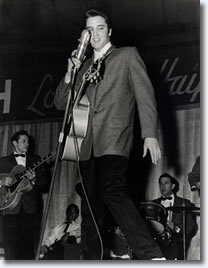 |
|---|
Elvis Presley - Louisiana Hayride. |
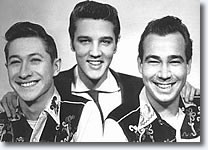 |
Elvis, Scotty & Bill.
|
Elvis Presley and Sun Records
The story of Elvis Presley's discovery begins with a shy, 18-year-old Elvis entering a recording studio in 1953 to cut two songs on an acetate disk at a cost of four dollars. The Memphis Recording Service was owned and operated by Sam Phillips, who had been recording rhythm-and-blues artists since 1950. By the time Elvis came to the recording studio, Sam Phillips was known as Memphis' most important independent record producer. He had opened Sun Records in 1952 to record both rhythm-and-blues (R&B) singers and country-western artists.
Phillips enjoyed a national reputation for discovering such talented R&B artists as Rufus Thomas and Junior Parker. Phillips recorded these performers for independent record companies in other parts of the United States, including Chess Records in Chicago and the Modern label in Los Angeles. Phillips financed the recording sessions, paid the musicians, recorded the artists himself (often serving as the studio engineer), and then leased the master recordings to other record companies. His reputation was built on his recordings of blues performers, but he had just begun to work with country singers when Elvis walked into his recording studio for the first time.
Unfortunately, on the day that Elvis decided to stop by, Phillips was not there. His tireless secretary and assistant, Marion Keisker, was running the recording studio alone. She noticed Elvis' flamboyant clothes and his long, slicked-back hair and engaged him in conversation. Marion asked Elvis what kind of music he sang and who he sang like. His prophetic answer, 'I don't sound like nobody', piqued her curiosity, and while Elvis was singing 'My Happiness' by the Ink Spots for his acetate record, Keisker also taped him so Phillips could hear him later. Elvis' second song for the flip side of the acetate was another Ink Spots song, 'That's When Your Heartaches Begin'. The recording cost Elvis $3.98.
He made a strong impression on Marion Keisker, a long-time Memphis radio personality who helped Sam Philips run his recording business at 706 Union.
There is little question that he stepped through the doorway at 706 Union with the idea, if not of stardom ... at the very least of being discovered. In later years he would always say that he wanted to make a personal record 'to surprise my mother' or 'I just wanted to hear what I sounded like'. But if he had simply wanted to record his voice, he could have paid twenty-five cents a TW.T. Grant's on Main Street ... Instead, Elvis went to a professional facility, where a man who had ben written up in the papers would hear him sing. Elvis dropped by 706 Union a number of times after that initial meeting to ask Ms. Keisker if she had heard of a band that needed a singer. In January 1954, he paid for a second personal record at the Memphis Recording Service.
Elvis Presley 1954
Even though nothing came of his first session at the Memphis Recording Service, Elvis was determined to give it another shot. He returned to the recording service in January 1954 to record two more songs on acetate. He sang 'Casual Love Affair' and a country tune called 'I'll Never Stand in Your Way'.
This time Phillips worked the controls. Though he offered the young singer little in the way of encouragement, he did take down Elvis' phone number and address.
January 4, 1954 Demo Session
![]() I'll Never Stand in Your Way CPA5 5101-NA
I'll Never Stand in Your Way CPA5 5101-NA
![]() It Wouldn't Be the Same Without You CPA5 5102-NA
It Wouldn't Be the Same Without You CPA5 5102-NA
![]() Acetate Receipt - I'll Never Stand in Your Way / It Wouldn't Be the Same Without You
Acetate Receipt - I'll Never Stand in Your Way / It Wouldn't Be the Same Without You
January 24, Fourteen year old Dixie Locke notices Elvis at a church function and making sure he overhears, makes plans with a girlfriend to go roller-skating the following Saturday night.
Saturday 30, Elvis appears at the Rainbow Rollerdome, where he 'bumps' into Dixie, speaking to her for the first time. He drives her home in his 1941 Lincoln.
February 16, Barely two weeks after their first meeting Elvis brings Dixie home to meet his parents.
February 26, Elvis and Dixie attend the all-Night Gospel singing at Ellis Auditorium together for the first time.
Elvis and Dixie will see each other virtually everyday throughout the summer, going to the movies two or three times a week.
April 18, Dixie has Easter dinner with Elvis' family.
April 20, Elvis starts work at Crown Electric, where he starts driving a truck at $1 an hour.
Sometime during the spring Elvis audition's for the Songfelows, the junior Blackwood group and is crushed when according to his recollection, he is told he can't sing - though members of the group later insist that they meant he couldn't sing harmony.
May 8, Elvis and Dixie attend the annual Memphis Cotton Carnival where Elvis runs into Ronald Smith, a friend they both knew from Dixie's South Memphis neighbourhood. Smith is a regular in Eddie Bond's band and tell's Elvis there is an opening in the band for a vocalist and he should come try out at the Hi-Hat.
May 9, Elvis and Dixie attend the Oral Roberts Crusade.
May 15, Elvis and Dixie go to the Hi-Hat on South Third to tryout for Eddie Bond's band. Elvis accompanies himself on guitar, singing two songs. The tryout does not get him a job. In latter years Elvis will dramatise the rejection by saying Eddie Bond told him to go back to driving a truck.
June 3, Dixie leaves for a family vacation in Florida.
June 5?, 1954 Sun Demo Session
June 26, Elvis has still not given up hope of a recording for Sun Records and continues to stop by the memphis Recording Service with that in mind. Marion Keisker finally called Elvis to set up an appointment, almost a year after he recorded his first personal disc. On a recent trip to Nashville, Philips had heard a song that reminded him of Presley's voice, and they worked on 'Without You' for several hours. Unfortunately, Elvis could not seem to master the song, so Phillips asked him to sing anything else he knew. Delighted with the opportunity, Elvis eagerly ran through his extensive repertoire of country songs and R&B tunes.
This rehearsal was most likely not recorded. Several songs were attempted without success, but no other titles are known. It's not impossible that they tried Casual Love Affair, since this much talked about song obviously wasn't the flipside of the second acetate. It's an interesting coincidence that the actual flipside was a song called It Wouldn't Be the Same (Without You). However, if any of the information given by Sam Phillips on the Peer Records demo and Elvis' second acetate is correct, it couldn't be the same Without You.
Phillips was impressed enough to suggest that the hopeful singer get together with Scotty Moore, a young guitarist who played with a local country-western combo, the Starlight Wranglers.
Elvis dropped by to see Moore almost immediately. Moore recalls, 'He had on a pink shirt, pink pants with white stripes down the legs, and white shoes, and I thought my wife was going to go out the back door -- people just weren't wearing that kind of flashy clothes at the time'. Moore introduced Elvis to bass player Bill Black, and the three musicians spent the long, hot Memphis summer trying to find a sound that clicked.
June 29, R.W. Blackwood and bass singer Bill Lyles, members of the Blackwood Brothers Quartet, are killed in a plane crash in Alabama. When the group decides to carry on, bass singer JD Sumner will join them.
Monday, July 5, The three of them went to the Sun studio because Sam Philips wanted to hear them on tape. Recently developed, magnetic recording tape made it possible for them to do one take of a song, listen to it, then make adjustments for the next take. Nothing special happened at the session until Presley began fooling around and playing an obscure 1946 blues song, 'That's Al Right', during a break.
Elvis started singing Arthur 'Big Boy' Crudup's blues song, 'That's All Right', with a fast rhythm and in a more casual style than most blues songs, and Moore and Black jumped in. Phillips' voice boomed out from the control booth, 'What are you doing?' None of them really knew. How could they?
How could they know that they had stumbled onto a new sound for a new generation?
Sam recognized it right away. He was amazed that the boy even knew Arthur 'BigBoy' Crudup - nothing in any of the songs he had tried so far gave any indication that he was drawn to this kind of music at all. But this was the sort of music that Sam had long ago whole heartedly embraced ... And the way the boy performed it, it came across with a freshness and an exuberance, it came across with the kind of clear-eyed, unabashed originality that Sam sought in all the music that he recorded - it was 'different', it was itself.
Phillips was excited about the trio's sound and recognized its potential. He asked them to refine their unique interpretation of 'That's All Right', and then he recorded it.
Above - In 1972 during taping of the Elvis On Tour movie, Elvis talked about making his first record for his mother. Elvis also talks about first time he appeared on stage and about the reaction to his movements while performing. Referring to his his performance of Teresa Brewer's 'Till I Waltz Again with You' at Humes High in 1953, Elvis said, 'It was amazing how popular I became at school after that'.
Scotty Moore says that it was Bill Black that came up with the flip side for what would be their first record. It was their rendition of the bluegrass standard 'Blue Moon of Kentucky', made famous by Bill Monroe.
![]() Scotty Moore Talks About The Sun Sessions
Scotty Moore Talks About The Sun Sessions ![]() (03:58)
(03:58)
![]() Interview with Scotty Moore
Interview with Scotty Moore ![]() - Scotty talks about meeting Elvis.
- Scotty talks about meeting Elvis.
Elvis syncopated certain lyrics, using a sort of hiccupping sound, while Sam Phillips added a reverberation, resulting in the famous echo effect. Elvis' style became the basis of 'rockabilly', the fusion of country music (commonly called hillbilly music) with a rhythm-and-blues sound that has been relaxed and speeded up, or 'rocked'. The term 'rockabilly' was not widely known until after Elvis became a household name.
At the time he cut his first record for Sun, there was no word that could adequately describe his style of music. When the press attempted to explain his sound, they usually made a mess of it, often confusing their readers with inappropriate or comical comparisons to other types of music. Elvis was referred to at various times as a 'hillbilly singer', 'a young rural rhythm talent', a 'white man...singing Negro rhythms with a rural flavour', and 'a young man [with a] boppish approach to hillbilly music'. Not long after Elvis' success, other rockabilly and country-western singers showed up on the doorstep of Sun Studio, hoping that Phillips could work the same magic with them as he had with Elvis. Phillips eventually recorded Johnny Cash, Jerry Lee Lewis, Carl Perkins, Roy Orbison, Charlie Feathers, Billy Lee Riley, Dickie Lee, and other artists.
![]()
![]() An Overview of
the Audio Restoration : Elvis At SUN
An Overview of
the Audio Restoration : Elvis At SUN
July 5, 1954 Sun Studio - Memphis, Tennessee
![]() Harbor Lights EPA3 2742-02
Harbor Lights EPA3 2742-02
![]() I Love You Because G2WB 1086-SP
I Love You Because G2WB 1086-SP
![]() That's All Right F2WB 8040-NA
That's All Right F2WB 8040-NA
'That's All Right Mama' was written and originally recorded by Arthur Crudup in 1954 but is best known by Elvis Presley's version. Elvis' version of the song, was combined with 'Blue Moon of Kentucky' as the B-side.
Its catalogue number was Sun 209. The label reads 'That's All Right' (omitting (Mama) from the original title), and names the performers as Elvis Presley, Scotty & Bill. Arthur Crudup is also listed on this label, giving him credit for authorship. Elvis Presley providing vocals and rhythm guitar, Scotty Moore on lead guitar, and Bill Black on upright 'slapped' bass. The recording contains no drums or additional instruments.
Upon finishing the recording session, according to Scotty Moore, Bill Black remarked ...
... 'Damn. Get that on the radio and they'll run us out of town'.
July 7, After a brief and unsuccessful session, Sam plays an acetate of 'That's All Right' for DJ Dewey Phillips, who flips over the song and vows to play it on his show the following evening.
July 8, Sam Philips brings WHBQ disc jockey Dewey Philips (No relation) two one sided acetates of the song 'That's All Right' to play on his ground-breaking Memphis radio show, 'Red Hot and Blue', then near the height of its popularity. The response was immediate - hundreds of phone calls and telegrams. Wink Martindale ![]() is in the studio at this time visiting Dewey. 'You could tell that something exciting was going on when the record was played', says Wink. (Wink was the morning DJ at WHBQ)
is in the studio at this time visiting Dewey. 'You could tell that something exciting was going on when the record was played', says Wink. (Wink was the morning DJ at WHBQ)
Gladys and Vernon listen to Dewey's evening show in anticipation of hearing their son on the radio.
Elvis goes to the movies a few blocks away.
When Dewey plays the acetate the switchboard lights up and he continues to play the song over and over again, calling the Presley home trying to get Elvis down to the studio. Gladys and Vernon go to the movie theater and finally locating Elvis send him down to the radio station. When a nervous Elvis finally appears Dewey makes casual conversation with him, not informing him until afterward that they have been on the air.
July 9, 1954 Sun Studio - Memphis, Tennessee
While the exact date of the session that produced the B-side for Elvis' first record is not known, the urgent need for a second side is re emphasized by the sensation that 'That's All Right' being played on Dewey's show has created. Some sources date it as July 6, some July 9 which makes more sense.
![]() Blue Moon of Kentucky F2WB 8041-NA
Blue Moon of Kentucky F2WB 8041-NA
July 11, Jerry Schilling joins five older boys in a touch football game at the invitation of Red West.
Jerry Schilling: 'The first time I heard Elvis was in the second week of July 1954. That Sunday, July 11, 1954, I go over to my local playground in North Memphis - a very poor neighborhood. There were five older boys in and out of high school trying to get up a football game. That's how unpopular Elvis Presley was at that point'.
'Elvis was just starting out, and nobody knew who he was yet'.
Jerry Schilling : 'Red West, a friend of my older brother's, knew I played grade school football. He said, 'Jerry, do you want to play with us?' Little kids love to play with the big guys, so, of course, I said, 'Sure'. We get in the huddle, and I swear to God I saw the other guy and said [To myself], 'That's the boy from Hume High that sang that song I just heard on the radio'. His name was never mentioned'.
Jerry Schilling : We can never forget that rock and roll was born out of segregation. It was dangerous for us to go down to Beale Street to buy our records. Our parents would have grounded us forever if they found out. It was a totally segregated society. Beale Street was black. Main Street was white. In the middle of all of that, Dewey Phillips played a record called 'That's All Right Mama' by a boy from Humes High School. He had to say Humes High School, because the audience would then know that he was white. Dewey played predominately black music. When 'That's All Right Mama' came on the radio, it was so exciting. It rolled it into something to be a part of. Interview with Jerry Schilling
![]() The King Finds His Voice : July 5, 1954
The King Finds His Voice : July 5, 1954
July 12, Scotty Moore becomes both manager and booking agent for the new group.
George Klein : Sun Records owner Sam Phillips, who had engineered the 'That's All Right' recording, had a hard time at first getting it on the air in most markets. 'It was so different - a white guy singing a rhythm and blues song. It was the beginning. A lot of guys were apprehensive to play it.
The black stations wouldn't play him because he was white, and the white stations wouldn't play him because he sounded black. Sam had to talk to friends and pull in favours.
He'd go to every little radio station in Mississippi, Arkansas and Tennessee to get it played'.
Klein says the song changed the Elvis he had known. 'He started changing immediately. He went from a low-profile shy guy to a guy who was now out there with a record and doing some shows, a little more polished, more sure of himself. It really was a pleasant surprise, and he was ready for it. He had prepared.
He had studied other singers and how they acted on stage'. The song didn't mean big money at first. Klein says Elvis, Moore and Black 'were probably getting $75 a night and splitting it three ways. For guys from Lauderdale Courts (public housing) that was pretty good, but it wasn't like having a million records sold'.
Scotty Moore: We spent two years 'paying our dues' from 1954 to 1956 when Elvis recorded 'Heartbreak Hotel', the song that hit No. 1 on the Billboard pop singles chart, No. 1 on the country charts and No. 5 on the R&B charts. They never felt unappreciated or worried they would wind up as a low-rent lounge act. 'Things increased very gradual, but, fortunately, they did increase from day one. Bill and I felt he (Elvis) would be big. The bigness just came faster than we thought it would'.
Red West, a Humes classmate a year behind Elvis, says he was at the school when he first learned of Elvis' record release. 'He pulled up in this little green car and asked me if I'd go on the road with him'.
West, an actor and acting coach, says Elvis was one of the few performers who never seemed to have stage fright. 'It's like he couldn't wait to get out there even in the early days, and he always knew the lyrics. It's like in the movies later. Elvis always knew his lines. I don't remember him ever flubbing a line in a movie'.
Like Klein, Red West says Elvis quickly changed from the shy boy he had known. 'There was a big difference. As soon as this happened he came out of the shell. He wasn't a bit shy anymore'.
Live Performances July 1954
Elvis, Scotty, and Bill start performing together, with Scotty acting as the group's manager. Elvis continues to work at Crown Electric as the group starts to play small clubs and other smalltime gigs locally and throughout the South, enjoying moderate success with the records and personal appearances.
July 17, Sam Phillips takes Elvis to the Bon Air Club where the Starlite Wranglers have a regular booking. Elvis, Scotty and Bill perform 'That's All Right' and 'Blue Moon of Kentucky'. The only two songs they know well enough to play in front of an audience. When they performed, all of the Wranglers had to leave the stage except Scotty and Bill since they were the only ones on the recording.
Their performance was not received well and did not sit well with the rest of the band since the crowd was a hard drinking traditional Country and Western crowd and they didn't care for Elvis' look or music.
After that night the they knew the Starlite Wranglers were finished as a group and Scotty and Bill gave their full attention to Elvis and the Blue Moon Boys. Sam Phillips then asked WMPS Memphis disc jockey Bob Neal to book Elvis on his Country Music Jamboree at the Overton Shell that featured Slim Whitman and Billy Walker as the headliners. It would be their first professional public performance as a band.
17 July. Memphis, Tn. Bon Air Club (8pm)
July 18, Late in the evening, the Locke family returns from their Florida vacation, and while driving into memphis Dixie hears 'Blue Moon of Kentucky' on the car radio. Dixie Locke: 'I knew what was going on, but neither he nor I had any idea of the magnitude of it.
I got a telegram from him saying, 'They're playing my records on the radio'. He was ecstatic over it. It was almost like disbelief that the disc jockeys would even play it'.
Sun 209 - July 19, Sun Records releases 'That's All Right', backed with 'Blue Moon of Kentucky' (Sun 209) - the first of five singles Elvis will release on the Sun label.
The song is a local hit in Mississippi as well as in Arkansas and New Orleans.
24 July. Memphis, Tn. Bon Air Club (8pm)
July 26, Elvis signs a contract with Sun Records. The royalty rate is 3% of the wholesale price.
Friday July 30, Elvis Presley made his first big public appearance with Scotty and Bill, the Blue Moon Boys, at Memphis's outdoor amphitheatre in Overton Park.
Advertised as a Hillbilly Hoedown, appearing in addition to Slim Whitman and Billy Walker were 'Sugarfoot' Collins, 'Sonny' Harvelle, Tinker Fry and 'Curly' Harris. The show began at 8:00 on the night of July, 30, 1954, and they started with Elvis, Scotty and Bill performing 'That's Alright Mama'. Elvis was so nervous he stood up on the balls of his feet and shook his leg in time with the music, a move he sometimes used in the studio. To his shock and horror the young girls in the audience went crazy, yelling and applauding. Scotty said, 'We didn't know what was going on when all those people started screaming and hollering'.
Next they did 'Blue Moon of Kentucky' and when Elvis got offstage he asked why people were yelling at him. Someone told him it was because he was shaking his leg, which with the baggy pleated pants created a wild gyrating effect in time with the music. Later in the show they returned and did the same two numbers along with 'I'll never let you go (Little Darlin'), a new song they had been working on.
The ad in the Memphis Press Scimitar misspelled Elvis' name 'Ellis' ![]() .
.
Live Performances August 1954
30 July. ![]() Memphis, Tn. Overton Park Shell (8pm)
Memphis, Tn. Overton Park Shell (8pm)
31 July. Memphis, Tn. Bon Air Club (8pm)
Sam Philips was on the road constantly after the Overton Park performance in July 1954, promoting the new records to distributors, disc jockeys, record store owners, and jukebox operators. His experiences, however, were entirely different. Time and again, disc jockeys who were old friends and/or long-standing business associates told Philips they could not play the Presley records. A country deejay told Sam, 'they'll run me out of town', while rhythm and blues deejays considered 'That's All Right' to be a country song. A disc jockey at a major pop station told Philips, 'your music is just so ragged. I just can't handle it right now. Maybe later on'. WELO in Tupelo, Mississippi, Presley's hometown, would not even play the record, in spite of many requests from teenagers, because the deejay did not like the new music.
'That's All Right' made Billboard's regional charts by the end of August, but the flip side was even more popular. Philips backed it with an unorthodox version of 'Blue Moon of Kentucky', a waltz that was a hit in 1946 for Bill Monroe, country music's elder statesman and the father of bluegrass music. By early September, 'Blue Moon' was No. 1 on the Memphis Country and Western chart and 'That's Al Right' was No. 7.
Live Performances August 1954
August 1, Elvis makes a brief radio appearance on radio station KWEM in West Memphis.
1 August. West Memphis, Tn. KWEM Radio
August 7, Billboard reviews Sun 209 ... calling Elvis 'A strong new talent'.
7 August. Memphis, Tn. Eagle's Nest (9pm)
August 19, 1954 Sun Studio - Memphis, Tennessee
![]() Blue Moon F2WB8117-06
Blue Moon F2WB8117-06
![]() Tomorrow Night F2WB 8115-07
Tomorrow Night F2WB 8115-07
![]() I'll Never Let You Go F2WB 8116-NA
I'll Never Let You Go F2WB 8116-NA
![]() Blue Moon F2WB 8117-06
Blue Moon F2WB 8117-06
Live Performances August 1954
27 August. Memphis, Tn. Eagle's Nest
29 August. Memphis, Tn. Kennedy Hospital, Gerwell Road
Live Performances September 1954
September 9, Elvis, Scotty and Bill were still playing strictly small gigs in and around Memphis. They were hired to perform at the grand opening of the Lamar-airways shopping ![]() center on September 9, 1954
center on September 9, 1954
9 September. Memphis, Tn. Lamar-airways Shopping Center - Katz drugstore ![]() Elvis' appearance at Katz drugstore draws a a huge crowd of teenagers and is MCed by Elvis' former Humes classmate George Klein.
Elvis' appearance at Katz drugstore draws a a huge crowd of teenagers and is MCed by Elvis' former Humes classmate George Klein.
10 September. The Eagles Nest, Memphis, Tennessee (9.00pm) ![]() (Elvis + 2 Ads)
(Elvis + 2 Ads)
11 September. The Eagles Nest, Memphis, Tennessee (9.00pm)
September 11-12, 1954 Sun Studio - Memphis, Tennessee
![]() I'll Never Let You Go - NA
I'll Never Let You Go - NA
![]() Satisfied -01 (1:07) (Tape Never found)
Satisfied -01 (1:07) (Tape Never found)
![]() I'll Never Let You Go OPA1 4197- NA
I'll Never Let You Go OPA1 4197- NA
![]() I Don't Care if the Sun Don't Shine F2WB8042-03
I Don't Care if the Sun Don't Shine F2WB8042-03
![]() Just Because F2WB 8118- NA
Just Because F2WB 8118- NA
![]() I'll Never Let You Go - NA
I'll Never Let You Go - NA
![]() Good Rockin' Tonight F2WB 8043-02
Good Rockin' Tonight F2WB 8043-02
![]() Just Because - NA
Just Because - NA
18 September. Memphis, Tn. Eagle's Nest (9.00pm)
September 17, Sometime during this period Elvis played the high school gymnasium in Bethal Springs, Tennessee. This was the first time Carl Perkins saw Elvis perform.
24 September. Memphis, Tn. Eagle's Nest (9.00pm)
25 September. Memphis, Tn. Eagle's Nest (9.00pm)
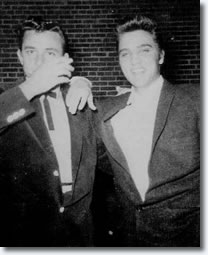 |
|---|
Johnny Cash & Elvis Presley. |
Johnny Cash - The first time I saw Elvis, singing from a flatbed truck at a Katz drugstore opening on Lamar Avenue, two or three hundred people, mostly teenage girls, had come out to see him. With just one single to his credit, he sang those two songs over and over. That's the first time I met him. Vivian and I went up to him after the show, and he invited us to his next date at the Eagle's Nest, a club promoted by Sleepy-Eyed John, the disc jockey who'd taken his name from the Merle Travis song and was just as important as Dewey Phillips in getting Sun music out to the world.
I remember Elvis' show at the Eagle's Nest as if were yesterday. I thought Elvis was great. He sang That's All Right, Mama and Blue Moon of Kentucky once again (and again) plus some black blues songs and a few numbers like Long Tall Sally, and he didn't say much. Read more from Johnny Cash.
Late September, Sun released Presley's second record. 'It was . . . an even bolder declaration of intent than the first, especially the strident blues number 'Good Rockin' Tonight', which rocked more confidently than anything they could have imagined in those first, uncertain days in the studio'.
Sun 210, 'Good Rockin' Tonight' / 'I Don't Care if The Sun Don't Shine' (Sun 210) is released.
Elvis' growing popularity enabled Philips to arrange a guest appearance on the Grand Ole Opry for October 2, even though the Opry had never before scheduled a performer at such an early stage in his career. The performance of 'Blue Moon of Kentucky' received a 'polite, but somewhat tepid, reception', and the Opry's manager told Philips that Presley 'just did not fit the Opry mold'. It was a big disappointment for Elvis.
Live Performances October 1954
In early October 1954, Carl Perkins and brothers Jay and Clayton loaded up Carl's '41 Plymouth coupe and headed to Memphis to seek out Sun Records. On arrival Car found Sam Phillips uninterested but after much pleading was granted an audition. Not unlike Elvis' first official tryout Sam initially found nothing of interest in what Carl and his band played in the small Sun Studio. This time it was not the explosive new 'That's All Right' type of performance that won Sam over but Carl finally playing one of his own songs, written when he was fourteen, and eventually to be titled 'Movie Mag'. 'Now that's original' Phillips called out - the way you play it, the way you sing it, the way you wrote it. Carl had one foot in the door. A career had begun.
1 October. Memphis, Tn. Eagle's Nest (9.00pm)
October 2, Sam Phillips has been trying to set up an appearance on the Grand Ole Opry, which he is finally able to arrange with Opry manager Bill Denny after Sam convinced him to 'just give the boy a chance'. Elvis sings 'Blue Moon of Kentucky' and receives a polite, but not vociferously enthusiastic reception. Bill Monroe on meeting Elvis, Scotty and Bill backstage complimented them and said he had just cut a new version of his song for Decca following their pattern, due out the next week.
2 October. Nashville. Grand Ole Opry, Ryman Auditorium (10.15pm)
6 October. Memphis, Tn. Eagle's Nest (9.00pm)
8 October. Atlanta. Ga. Silver Slipper
9 October. Memphis, Tn. Eagle's Nest
13 October. Memphis, Tn. Eagle's Nest (9.00pm)
15 October. Memphis, Tn. Eagle's Nest (9.00pm) ![]()
16 October. Shreveport. Louisiana Hayride, Municipal Auditorium ![]()
Elvis, Scotty and Bill appear for the first time on the Louisiana Hayride, a live Saturday night country music radio show originating in Shreveport, Louisiana, broadcast over KWKH Radio. The show is the Grand Ole Opry's chief competitor, carried by 190 stations in thirteen states. This leads to regular appearances on the Hayride. This time the band was well received. The Hayride had a show every Saturday night, and shows on the third Saturday of each month were broadcast with a 50,000 watt signal that reached up to 28 states.
After only one guest appearance, Presley signed a standard one-year contract to be one of the Hayride's regular members, and he, Scotty, and Bill quit their day jobs.
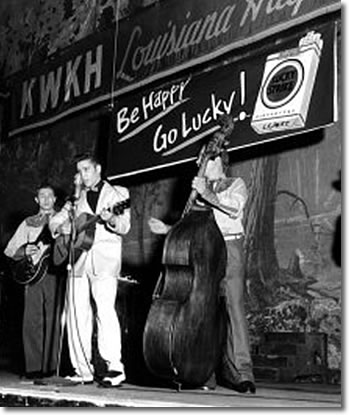
Scotty, Elvis, Bill on the Louisiana Hayride : Oct. 16, 1954.
20 October. Memphis, Tn. Eagle's Nest
23 October. Shreveport. Louisiana Hayride, Municipal Auditorium.
29 October. Memphis, Tn. Eagle's Nest (9.00pm)
Bob Neal brings Oscar Davis to the club on either the 29th or 30th.
Davis at the time is working as a front man for Colonel Tom Parker.
30 October. Memphis, Tn. Eagle's Nest (9.00pm)
November 1954
In November, Elvis signs a one-year contract for fifty-two Saturday night appearances on the Louisiana Hayride. This is a great break, but as Elvis' popularity grows, his commitment to the Hayride prevents him from traveling much outside the South to further his career on a larger scale. During Elvis' association with the Hayride he meets Colonel Tom Parker, a promoter and manager connected with various acts, and connected with the Louisiana Hayride. Parker is also the manager for country star, Hank Snow.
A previous Parker client is country star Eddy Arnold.
Live Performances November 1954
6 November. Shreveport. Louisiana Hayride, Municipal Auditorium (8.00pm)
8 November. Memphis. Memphis State (Solo appearance)
13 November. Shreveport. Louisiana Hayride, Municipal Auditorium (8.00pm)
November 15, 1954 Sun Studio - Memphis, Tennessee
![]() I'm Left You're Right She's Gone (Slow) OPA1 4196-05
I'm Left You're Right She's Gone (Slow) OPA1 4196-05
![]() I'm Left You're Right She's Gone F2WB 8047-06
I'm Left You're Right She's Gone F2WB 8047-06
Live Performances November 1954
17 November. Memphis, Tn. Eagle's Nest (9.00pm)
19 November. Shreveport, Lake Cliff Club ![]() - 'Elvis Pressley' tops this bill at this show.
- 'Elvis Pressley' tops this bill at this show.
20 November. Shreveport, Louisiana Hayride, Municipal Auditorium (8.00pm)
21 November. Houston Texas. Magnolia Gardens
21 November. Houston Texas. Cook's Hoedown Club
November 23, Elvis makes his first appearance in Gladewater, Texas, at a show put on at the Mint Club by Tom Perryman, a local DJ, who will continue to book Elvis in the northeast Texas area well into the following year. Because newspaper ads either do not exist or simply have not been found, his earliest appearances in this region have yet to be precisely dated.
23 November. Gladewater, Texas. Ksij Radio, Mint Club ![]()
24 November. Municipal Auditorium, Texas
25 November. Houston, Texas. Paladium Club
26 November. Houston, Texas. Paladium Club
27 November. Paladium Club, Houston, Texas
27 November. Cook's Hoedown Club, Houston, Texas
28 November. Magnolia Gardens, Houston, Texas
Live Performances December 1954
2 December. Catholic Club, Helena, Arkansas
3 December. Texarkana, Arkansas. Municipal Auditorium.
4 December. Shreveport, Louisiana Hayride, Municipal Auditorium (8.00pm)
10 December. Memphis, Tn. Eagle's Nest (9.00pm)
11 December. Shreveport, Louisiana Hayride, Municipal Auditorium (8.00pm)
17 December. High School Gymnasium, Hawkins, Texas
18 December. Shreveport, Louisiana Hayride, Municipal Auditorium (8.00pm)
December 1954 Sun Studio - Memphis, Tennessee
December 8-20, Sometime during this period it is likely has his next recoding session.
![]() Milkcow Blues Boogie F2WB 8044-NA
Milkcow Blues Boogie F2WB 8044-NA
![]() You're a Heartbreaker F2WB 8045-NA
You're a Heartbreaker F2WB 8045-NA
December 23, Elvis, Scotty and Bill were stopped for speeding on their way home from Shreveport. Elvis recalled in a interview: 'I thought: Here goes my Christmas money for a traffic ticket. But the officer let us go with a warning. After the officer left, the 3 of us got out of the car and counted our money by the car headlights. The money was mostly in dollar bills, Man, that was the most money I ever had in my pockets at one time! I blew the whole bundle the next day for Christmas presents'.
December 25, Christmas on Alabama Street
28 December. Houston Texas. Cook's Hoedown Club
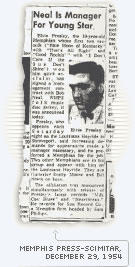 December 29, The Memphis Press-Scimitar reports that 'Elvis Presley ... has signed a management contract with Bob Neal, replacing Scotty Moore'.
December 29, The Memphis Press-Scimitar reports that 'Elvis Presley ... has signed a management contract with Bob Neal, replacing Scotty Moore'.
31 December 31. NCO Club, Red River Arsenal, Texarkana, Arkansas
Elvis Presley 1955
January 1, Elvis' new managerial contract with Bob Neal goes into effect on this date, with a smiling picture of Elvis, Neal, and Sam Phillips that commemorates the occasion appearing in various periodicals and fan magazines over the next couple of months.
1 January. Houston, Texas. Eagles Hall, Broadcast over KNUZ Radio
Tour of west Texas. Jan. 4 - Jan. 7
4 January. Odessa, Texas. High School Auditorium (6pm & 8pm)
January 5, 'Alvis Presley' ![]() tops the bill at a show in this 1,855--seat auditorium, where hundreds of teenaged girls rush the stage for autographs. Hayride artists Billy Walker and Jimmy and Johnny and country comic Peach Seed Jones complete the lineup.
tops the bill at a show in this 1,855--seat auditorium, where hundreds of teenaged girls rush the stage for autographs. Hayride artists Billy Walker and Jimmy and Johnny and country comic Peach Seed Jones complete the lineup.
5 January. San Angelo, Texas. City Auditorium (8pm)
January 6, may be the date of a much remembered show by Elvis, Billy Walker, and Jimmy and Johnny, at which future country star (and sometime bass player with Buddy Holly) Waylon Jennings recalls having met the young 'hillbilly cat'. In Jennings' recollection, Elvis declared that his next record would be 'Tweedlee Dee', by rhythm--and--blues star LaVern Baker, which is just picking up steam, hitting the rhythm--and--blues charts on January 15, 1955. On this same date, or else upon his return to Lubbock on February 13, Elvis records his version of two r & b hits, 'Fool, Fool, Fool' by the Clovers, and 'Shake, Rattle and Roll' by Big Joe Turner, at local radio station KDAV, as a promotion for the evening's show.
January 6, 1955 (Demo Session) 'Cotton Club' - Lubbock, Texas
![]() Fool, Fool, Fool WPA5 2533-NA
Fool, Fool, Fool WPA5 2533-NA
![]() Shake, Rattle and Roll WPA5 2534-NA
Shake, Rattle and Roll WPA5 2534-NA
6 January. Lubbock, Texas. Cotton Club (9pm)
7 January. Midland, Texas. Midland High School (8pm)
8 January. The Louisiana Hayride. Municipal Auditorium, Shreveport, Louisiana (8pm)
Elvis is introduced as the 'Memphis Flash' and described to the radio audience by announcer Frank Page as wearing crocodile--skin shoes with pink socks. He performs 'That's All Right', 'Hearts of Stone', 'Blue Moon of Kentucky', and 'Fool, Fool, Fool'. The bill includes rising country star Johnny Horton, known as 'The Singing Fisherman', who will have a huge pop hit four years later with 'The Battle of New Orleans'.
Tour of region around Memphis. Jan. 11 - Jan. 21
11 January. High School Gymnasium, New Boston, Texas
12 January. Clarksdale, Ms. City Auditorium.
13 January. Catholic Club, Helena, Arkansas
14 January. Marianna, Arkansas
January 15, Colonel Tom Parker ![]() and Tom Diskin arrive in Shreveport and register at the Captain Shreve Hotel. Elvis performs on The Louisiana Hayride in the evening, this is almost certainly the first time either of them see Elvis Presley perform, and The Colonel takes steps to forge a link with Elvis' manager Bob Neal after the show. Colonel Parker starts booking shows for Elvis on behalf of Bob Neal.
and Tom Diskin arrive in Shreveport and register at the Captain Shreve Hotel. Elvis performs on The Louisiana Hayride in the evening, this is almost certainly the first time either of them see Elvis Presley perform, and The Colonel takes steps to forge a link with Elvis' manager Bob Neal after the show. Colonel Parker starts booking shows for Elvis on behalf of Bob Neal.
It is likely that Elvis meets Colonel Tom Parker on this day for the first time -- D.J. Fontana, Tommy Sands and Charlie Lamb have all told Alanna Nash, that Colonel Parker traveled to other Elvis shows before this, but just studied him, and did not introduce himself to Elvis.
15 January. The Louisiana Hayride. Municipal Auditorium, Shreveport, Louisiana (8pm)
Elvis sports a rust--colored suit, black--dotted purple tie, and pink socks and performs 'Hearts of Stone', 'That's All Right', and 'Tweedlee Dee'.
January 17, Bob Neal writes to Ed McLemore of the Big 'D' Jamboree to let him know that Colonel Parker will be doing bookings for him and Elvis, 'just like MCA or William Morris or any other agency.
'According to Neal, Parker is attempting to get a booking at 'one of the big resort hotels in Nevada' and is 'negotiating a deal that is terrific, to say the least'.
17 January. Boonesville, MS. Northeast Mississippi Community College
18 January. Corinth, MS. Acorn Country Courthouse Assembly Hall
19 January. Sheffield, AL. Community Centre
20 January. Leachville, Arkansas
21 January. Sikeston ![]() . MO. National Guard Armony
. MO. National Guard Armony
January 22, Colonel Parker informs Bob Neal by letter that he has booked Elvis on the Hank Snow Tour from February 14 to 18, sending both a contract and a check made out to Elvis Presley for $425, a 50 percent advance on what he can expect to earn for the tour.
22 January. ![]() The Louisiana Hayride. Municipal Auditorium, Shreveport, Louisiana (8pm)
The Louisiana Hayride. Municipal Auditorium, Shreveport, Louisiana (8pm)
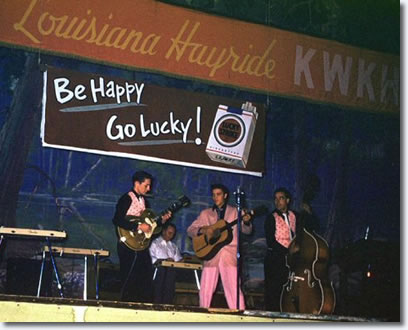
Elvis, Scotty & Bill on The Louisiana Hayride : January 22, 1955.
Elvis performs 'Money Honey', 'I Don't Care If the Sun Don't Shine', 'Blue Moon of Kentucky'' and 'That's All Right'. Live recordings are available from this date and will be available on the Sun box set Due late 2008.
Tour of east Texas. Jan. 24 - Jan. 28
24 January. Hawkins, Texas. Recreation Hall, Humble Oil Camp
25 January. Tyler, Texas. Mayfair Building, Fairgrounds
26 January, Gilmer, Texas. Rural Electrification Administration Building
27 January. Longview, Texas. Reo Palm Isle Club
28 January. Gaston, Texas. High School Auditorium
29 January. The Louisiana Hayride ![]() - Municipal Auditorium, Shreveport, Louisiana (8pm)
- Municipal Auditorium, Shreveport, Louisiana (8pm)
1 February. High School Auditorium, Randolph, Mississippi
February 2, The newspaper ad for the show pictures Elvis, Scotty, and Bill ('The Blue Moon Boys') still dressed in their western shirts. This photograph will continue to be used for some months in newspapers throughout the South, though Scotty and Bill have by now stopped wearing the cowboy styled outfits.
2 February. High School Auditorium, Augusta, Arkansas
February 3, ![]() most likely, Elvis, Scotty, and Bill take time to work on new songs in the studio during this week. On February 5 a posed photograph appears in the Memphis Press--Scimitar showing the three of them at Sun, with Sam Phillips at the console. During this time they record 'Baby Let's Play House', which will be the A--side of their next single, along with still -- unreleased (and undiscovered as of 1999) versions of Ray Charles' 'I Got a Woman' and 'Trying to Get to You'. After the session Stan Kesler, a steel guitarist who works primarily on Sun's hillbilly sides, goes home and writes what will become the B--side, 'I'm Left, You're Right, She's Gone', based on the melody of the Campbell's Soup commercial.
most likely, Elvis, Scotty, and Bill take time to work on new songs in the studio during this week. On February 5 a posed photograph appears in the Memphis Press--Scimitar showing the three of them at Sun, with Sam Phillips at the console. During this time they record 'Baby Let's Play House', which will be the A--side of their next single, along with still -- unreleased (and undiscovered as of 1999) versions of Ray Charles' 'I Got a Woman' and 'Trying to Get to You'. After the session Stan Kesler, a steel guitarist who works primarily on Sun's hillbilly sides, goes home and writes what will become the B--side, 'I'm Left, You're Right, She's Gone', based on the melody of the Campbell's Soup commercial.
During this week the trio also appear at school programs at Messick High School and Messick Junior High to help Sonny Neal, Bob's son, in his campaign for the student council.
February 3, 1955 Sun Studio - Memphis, Tennessee
![]() Baby Let's Play House F2WB 8046-02
Baby Let's Play House F2WB 8046-02
![]() I Got A Woman - 02
I Got A Woman - 02
![]() Trying To Get To You - 01
Trying To Get To You - 01
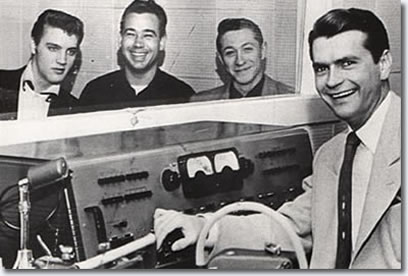
Elvis Presley, Bill Black, Scotty Moore & Sam Phillip's February 3, 1955.
4 February. Jesuit High School, New Orleans, Louisiana
February 5, A four--column story in the Memphis Press--Scimitar announces, 'Through the Patience of Sam Phillips Suddenly Singing Elvis Presley Zooms into Recording Stardom', noting that 'a white man's voice singing Negro rhythms with a rural flavour [has] changed life overnight for Elvis Presley'.
5 February. The Louisiana Hayride. Municipal Auditorium, Shreveport, Louisiana (8.00pm)
Wearing pink pants and tie with a charcoal jacket, Elvis performs 'That's All Right', 'Blue Moon of Kentucky', 'Tweedlee Dee', and 'Money Honey'.
February 6, ![]() By the time Elvis performed for the first time at Memphis's Ellis Auditorium, he and the Blue Moon Boys were working almost every night. In mid-February they were booked as part of a Hank Snow/Jamboree Attractions package tour that began in Roswell, New Mexico. For all of his local eminence, Elvis is listed down on the bill, below such established stars as Hayride graduate Faron Young, Ferlin Huskey, and 'Beautiful Gospel Singer' Martha Carson, whose signature tune', 'Satisfied', is one of Elvis' favourites.
By the time Elvis performed for the first time at Memphis's Ellis Auditorium, he and the Blue Moon Boys were working almost every night. In mid-February they were booked as part of a Hank Snow/Jamboree Attractions package tour that began in Roswell, New Mexico. For all of his local eminence, Elvis is listed down on the bill, below such established stars as Hayride graduate Faron Young, Ferlin Huskey, and 'Beautiful Gospel Singer' Martha Carson, whose signature tune', 'Satisfied', is one of Elvis' favourites.
Between shows Bob Neal arranges a meeting between Sun Records president Sam Phillips and Colonel Tom Parker and Tom Diskin at Palumbo's Restaurant across the street from the auditorium. The ostensible purpose of the meeting is to discuss the future of the young performer in whom they are all so interested.
Neal is very much encouraged by the Colonel's enthusiasm, but the meeting does not go well, as Parker explains to Sam Phillips that Elvis is going nowhere on a small--time label like Sun and that he has already made overtures to RCA to buy the contract. Sam Phillips does not react well to this piece of information, and Parker silently revises his plan without ever retreating.
6 February. Memphis. North Hall Of Ellis Auditorium (3.00pm & 8.00pm)
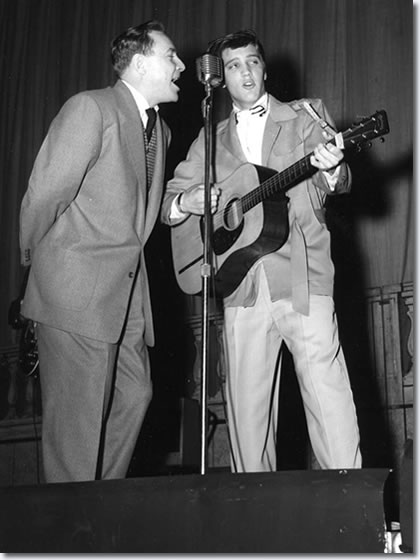
Dewey Phillips & Elvis Presley Ellis Auditorium, Memphis February 6, 1955.
7 February. Ripley MISS. Ripley High Gymnasium
February 10, Colonel Parker has had Tom Diskin inform Steve Sholes, RCA's head of A & R in the company's country--and--western division (A & R stands for 'artists and repertoire' and encompasses everything to do with recording, from renting the studio to finding the songs to producing the session) that Elvis Presley 'is pretty securely tied up' at Sun while simultaneously trying to convince Sholes to sign Tommy Sands instead. Sholes replies on this date that 'the last I heard from the Colonel seemed quite favourable toward our signing Elvis Presley so naturally your comments with respect to Presley were a little surprising'. His letter does not indicate that he feels Tommy Sands is a suitable replacement.
Tour of East Texas and New Mexico. Feb. 10 - Feb. 18
10 February. Alpine, Texas. High School Auditorium
11 February. Carlsbad, NM. Sports Arena (4pm & 8pm)
12 February. Carlsbad, NM. American Legion Hall
13 February. Lubbock, Tx. Fair Park Coliseum (4pm matinee)
This is the first booking that Neal has obtained directly through Colonel Parker.
The group receives $350 for their matinee performance. A young Buddy Holly appears at the bottom of this bill as half of the country--and--western duo Buddy and Bob.
13 February. Lubbock, Tx. Cotton Club (8pm) ![]()
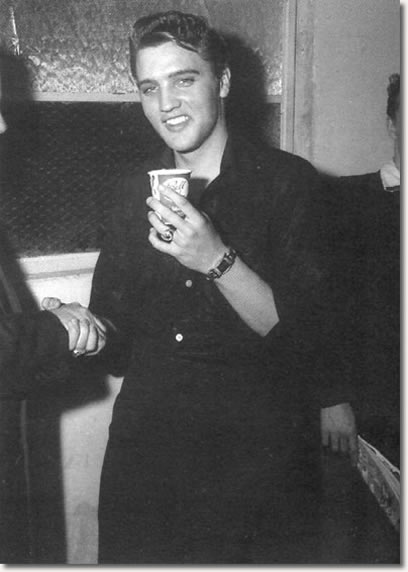
Elvis Presley February 13, 1955 : Fair Park Coliseum, Lubbock, Texas.
14 February. Roswell, NM. North Junior High School (7.30pm & 9.30pm)
15 February. Abilene, Texas. Fair Park Auditorium (7.00pm & 9.00pm)
16 February. Odessa, Texas. Senior High School Field House (7.30pm & 9.30pm)
17 February. San Angelo, Texas. City Auditorium (7.30pm & 9.30pm)
18 February. West Monroe. LA. High School (7.30pm & 9.30pm)
19 February. The Louisiana Hayride. Municipal Auditorium, Shreveport, Louisiana (8pm)
Week long tour of Arkansas and Louisiana. Feb. 20 - Feb. 25
February 20, Elvis begins another Jamboree Attractions tour, this one billed as a 'WSM Grand Ole Opry' show and headlined as an Extra Added Attraction by the Duke of Paducah and country music legends Mother Maybelle (Carter) and her daughters, the Carter Sisters.
As a specially advertised feature attraction, however, with billing throughout the tour as big as the Duke of Paducah's (the tickets for Little Rock actually advertise 'The Elvis Presley Show'), Elvis, Scotty, and Bill receive $350 for these two shows instead of their usual $200 per day.
20 February. Little Rock, AR. Robinson Auditorium (3.00pm & 8.15pm)
21 February. Camden, AR. City Auditorium
22 February. Hope AR. City Hall
On May 23, 1955 Elvis performed at the High School Auditorium, Pine Bluff, Arkansas, at 7:30pm and 9:30pm.
Click the link above to hear a radio promotion in advance of the events.
23 February. Pine Bluff AR. Watson Chapel High School (7.30pm & 9.30pm)
24 February. Bastrop, LA. South Side Elementary School (7.30pm & 9.30pm)
25 February. Texarkana, AR. City Auditorium
26 February. Cleveland, OH. Circle Theatre (7.30pm & 10.30pm)
March 1955, During the early part of March, Elvis returns to Sun and records 'I'm Left, You're Right, She's Gone' both as a slow blues and in the up--tempo country form in which it was written.
The faster version incorporates drums, which are played by Memphis teenager Jimmie Lott, the first non -- Blue Moon boy to play on an Elvis Presley record.
Performances local to Memphis. March 2 - March 10
2 March. Newport, AR. Armory (8.00pm)
2 March. Newport, AR. Porky's Rooftop Club (10.00pm)
3 March 3. Municipal Auditorium, Texarkana, Arkansas
(8.00pm)
4 March. DeKalb, Texas. High School
5 March. The Louisiana Hayride. Municipal Auditorium, Shreveport, Louisiana (8pm)
March 7, Elvis, Scotty, and Bill are now the headliners on a show made up for the most part of lesser--known artists like Betty Amos, Onie Wheeler, and Jimmy Work.
William Morris agent Harry Kalcheim telegrams Colonel Parker to inquire if Elvis can audition for Arthur Godfrey's Talent Scouts, the same show that Bill Randle has recommended so enthusiastically just a short time before. Parker replies blusteringly that he is willing to pay for the trip to New York only if Neal and Elvis agree to give the Colonel the right to represent Elvis on 'any bookings that may arise [from] the appearance'.
7 March. City Auditorium, Paris, Tennessee
8 March. Catholic Club, Helena, Arkansas
9 March. Poplar Bluff, MO. Armony
March 10, Harry Kalcheim cables the Colonel that he has set up the Godfrey audition for March 23, and should Elvis win first place, he will appear on Godfrey's morning TV show for the following three weeks.
10 March. Clarksdale, MS. City Auditorium
11 March. Jimmie Thompson's Arena, Alexandria, Louisiana
12 March. The Louisiana Hayride. Municipal Auditorium, Shreveport, Louisiana (8pm)
March 14, The Colonel agrees to pay for the trip to the Arthur Godfrey show after securing Neal's promise to protect the Colonel's interest in any bookings that may arise from the tryout.
March 15, Elvis signs an amended one--year agreement with Bob Neal from which Neal will receive a 15 percent management fee.
16 March. 16. Ruffin Theatre, Covington, Tennessee
17 March. 17. Dessau Hall, Pflugerville, Austin, Texas
18 March. Jimmy Thomason's 'The Home Folks Show' - Channel 6, Wako, Texas
March 19, at the Eagle's Hall Elvis 'Pressley' tops a bill that includes both Hoot Gibson, the western movie star, and Tommy Sands, with Biff Collie once again master of ceremonies. Live recordings of 'Good Rockin' Tonight', 'Baby Let's Play House', 'Blue Moon of Kentucky', 'I Got a Woman', and 'That's All Right' are recorded.
19 March. Houston, Texas. Eagle's Hall 8 pm to 11 pm
20 March. Houston, Texas. Magnolia Gardens (matinee)
20 March. Houston, Texas. Cook's Hoedown Club (eve)
21 March 21. High School Auditorium, Parkin, Arkansas
March 23, In what is almost certainly Elvis' first airplane flight, he travels to New York City with Scotty, Bill, and Bob Neal. The Arthur Godfrey audition takes place at 2:30 p.m. on the fourteenth floor at 501 Madison Avenue. The Talent Scouts show no interest whatsoever.
24 March. High School Auditorium, Marianna, Arkansas
25 March. High School Auditorium, Dermott, Arkansas
![]() Elvis, Scotty and Bill at Coley's Truck Stop in Dermott, AR : March 25, 1955.
Elvis, Scotty and Bill at Coley's Truck Stop in Dermott, AR : March 25, 1955.
26 March. The Louisiana Hayride. Municipal Auditorium, Shreveport, Louisiana (8pm)
28 March. High School Gymnasium, Big Creek, Mississippi (sponsored by the junior class)
March 29, The Colonel voices his concern to Bob Neal once again about Sun Records. It is very difficult, he says, to interest promoters outside of the small range of Sun's distribution in the young singer. He asks Neal to find out from Sam Phillips where the records are selling so that he can seek out promoters in those areas.
29 March. High School, Toccopola, Mississippi (sponsored by the junior class)
Arkansas & Texas shows. March 30 - Apr. 2
30 March. El Dorado, Arkansas. High School Auditorium
31 March. Longview. Texas. Reo Palm Isle
1 April. Odessa, Texas. Ector County Auditorium.
2 April. Houston, Texas. City Auditorium The Louisiana Hayride - Remote broadcast.
Elvis appears on a Hayride remote broadcast (Above) with Slim Whitman, Hoot and Curley, Johnny Horton, Tibby Edwards, Floyd Cramer, and others. He performs 'Little Mama', 'That's All Right', 'You're a Heartbreaker', and 'Shake, Rattle and Roll'. Billboard reports on June 4 that 2,000 people were turned away from this performance and that Elvis and Slim Whitman both tore the house down.
April 3, Elvis is stopped for speeding outside of Shreveport in the 1954 four--door pink--and--white Cadillac that he has bought since Bill wrecked the Lincoln.
He posts $25 bond and is notified to appear for arraignment on Tuesday, April 5.
7 April. Corinth, MS. Court House Meeting Room (2.00pm & 8.00pm)
8 April. Glober MO. B&B Club
9 April. The Louisiana Hayride. Municipal Auditorium, Shreveport, Louisiana (8pm)
April 10, 1955, is generally cited as the release date for Elvis' fourth single, 'Baby Let's Play House'/'I'm Left, You're Right, She's Gone' (Sun 217). Cash Box reviews the single in May, saying:
'The polished style of 'I'm Left, You're Right, She's Gone' comes over in true fashion on an intriguing and forceful item with a solid beat'. About 'Baby Let's Play House' the reviewer opines', [This] is a real different, fast--paced piece on which Presley sparkles'.
Week of concerts in Texas. Apr. 10 - Apr. 16
10 April. Houston, Texas. Magnolia Gardens (matinee)
10 April. Houston, Texas. Cook's Hoedown Club (eve)
April 13, Elvis sings 'That's All Right', 'I Don't Care If the Sun Don't Shine', 'Tweedlee Dee', and ends with 'Blue Moon of Kentucky'. The paper reports that many of the young women 'swooned with his every appearance on stage'. It is also noted that more than one man is overheard saying: 'I'd like to meet him out behind the bar', or 'I'd better not see any girlfriend of mine going up after an autograph from that singer'.
13 April. Breckenridge, Texas. High School Auditorium
14 April. Gainsville, Texas. Owl Park Baseball Field
15 April. Stamford, Texas. High School (7pm)
15 April. Stamford, Texas. Roundup Hall (9pm)
16 April. Dallas, Texas. Sportarium.
Shows out from Mississippi to west Texas. Apr. 20 - Apr. 30
20 April. Grenada, MS. American Legion Hut
21 April. High School Football Field, New Boston, Texas
22 April. Texarkana, AR. Arkansas Municipal Stadium
23 April. Waco, Texas. Heart O' Texas Coliseum - Louisiana Hayride ![]() - Remote Broadcast.
- Remote Broadcast.
24 April. Houston, Texas. Magnolia Gardens (matinee)
24 April. Houston, Texas. Cook's Hoedown Club (eve)
25 April. Wichita Falls, Texas. M-B Corral Club
25 April. Seymour, Texas. High School Auditorium
26 April. Big Spring, Texas. City Auditorium
27 April. American Legion Hall, Hobbs, New Mexico (8.30pm)
27 April. American Legion Hall, Hobbs, New Mexico (12.00am)
28 April. Beckenridge (or Cisco), Texas (8.00pm)
April 29, 1955 Elvis, Scotty and Bill returned to Lubbock and performed at The Cotton Club. For over forty years the Cotton Club stood as the most influential and diverse performance venue in the region. It was once the only profitable venue for a band to stop between Dallas and Los Angeles.
The Cotton Club was unique because of its blindness to race, color and musical genre, presenting artists such as Little Richard, Elvis, and Willie Nelson among many others.
29 April. Lubbock, Texas. Cotton Club
Some of the earliest film footage of Elvis was shot there of this performance and backstage by local, Ben Hall. Ben would later write 'Blue Days, Black Nights', one of the first songs recorded by Buddy Holly in Nashville after he signed with Decca and subsequently his first release. On later dates Ben also shot backstage film footage there of Buddy, Sonny Curtis, Don Guess, Carl Perkins and Johnny Cash.
30 April. Gladewater, Texas. High School Gymnasium ![]() The Louisiana Hayride - Remote broadcast.
The Louisiana Hayride - Remote broadcast.
Elvis' performance of 'Tweedlee Dee' is recorded at this remote broadcast.
Another tour with Hank Snow/Jamboree Attractions begin on May 1 in New Orleans, with 20 cities in three weeks, including a number of stops in Florida. There was a 'riot' backstage after the concert in Jacksonville.
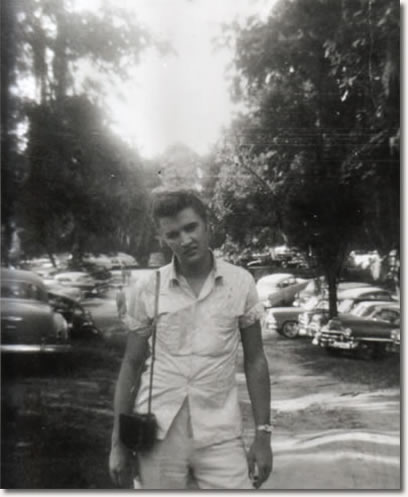
Elvis taking a break during a heavy tour schedule : May 1955.
In May 1955 Elvis was touring the south on a daily base. On May 6 he took a day off, to go to Dixie Locke's junior prom. Late May Col. Parker wrote to Bob Neal that he wanted to tie in in promoting Elvis' carreer.
The month may brought Elvis from New Orleans to Odessa, having stops in Mobile, Tampa, Orlando, Jacksonville and Asheville among others.
1 May. New Orleans, LA. Municipal Auditorium (2.00pm, 5.00pm 7 8.00pm)
2 May. Baton Rouge, LA. High School Auditorium (7.00pm & 9.00pm)
May 4, Elvis Presley joined Faron Young as the headliners of the Hank Snow All-Star Jamboree.
Though Elvis was already a rising star at this point, it's worth noting that his previous tour appearance came at the Baton Rouge High School Auditorium.
Just a week later, Presley caused a near riot at a Jacksonville, Fla., show when, at the conclusion of his performance, he announced to the audience of 14,000, 'Girls, I'll see you backstage'.
4 May. Mobile, AL. Ladd Stadium
5 May. Mobile, AL. Ladd Stadium - A pack of girls chases Elvis across the football field.
Elvis returns to Memphis to attend ![]() Dixie Locke's junior prom, where he double--dates with his cousin Gene Smith and Bessie Wolverton, one of Dixie's best friends.
Dixie Locke's junior prom, where he double--dates with his cousin Gene Smith and Bessie Wolverton, one of Dixie's best friends.
May 6, The show, including Scotty and Bill but not Elvis, plays Birmingham, Alabama.
7 May. Daytona Beach, FL. Peabody Auditorium
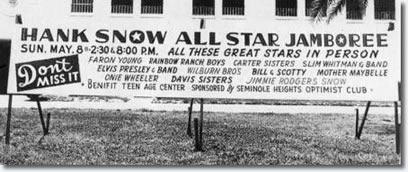
8 May. Tampa, FL. Fr. Homer Hesterly Auditorium (2.00pm & 8.15pm)
9 May. Fort Myers, FL. City Auditorium
10 May. Ocala, FL. Southeastern Pavilion 11 May. Orlando. FL. Municipal Auditorium ![]()
May 11, In Faron Young's recollection, the audience calls for Elvis when Hank Snow takes the stage.
The announcer tries to restore order by telling the crowd that Elvis is out back signing autographs, and the auditorium empties.
11 May. Municipal Auditorium, Orlando, Florida (7.30pm & 9.30pm)
12 May. Jacksonville, FL. Gator Bowl Baseball Park
13 May. Jacksonville, FL. Gator Bowl Baseball Park ![]()
At the conclusion of his performance, Elvis announces to a good portion of the audience of 14,000: 'Girls, I'll see you backstage'. The response is a full--scale riot, with fans pursuing Elvis into the dressing room and tearing off his clothes and shoes. In the opinion of the Colonel's advance man, Oscar Davis, this was the point at which Colonel Parker was irrevocably sold on the growth potential of Elvis Presley.
14 May. New Bern, NC. Shrine Auditorium (7.00pm & 9.00pm)
15 May. Norfolk, VA. Norfolk City Auditorium (3.00pm & 8.00pm)
16 May. Richmond, VA. Mosque Theather
RCA field representative Brad McCuen (responsible for east Tennessee, Virginia, and the Carolinas) and country--and--western promotion manager Chick Crumpacker are in the audience on May 16 to check out some of their acts. Crumpacker remembers being bowled over'. What really got the listeners was his energy and the way he sang the songs. The effect was galvanic'.
Subsequently Crumpacker makes a point of taking all of Elvis' records back to New York to give to his boss, Steve Sholes, who, unbeknownst to him, is already well aware of the new act.
17 May. Asheville, NC. City Auditorium (7.00pm & 9.00pm)
18 May. Roanoke, VA. American Legion Auditorium
19 May. Raleigh, NC. Memorial Auditorium
Audiences had never before heard music like Elvis, Scotty and Bill played, and they had never before seen anyone who performed like Elvis Presley either. The shy, polite, mumbling boy gained self- confidence with every appearance, which soon led to a transformation on stage. People watching the show were astounded and shocked, both by the 'ferocity of his performance', and the crowd's reaction to it.
Even in the early days, Elvis almost always stole the show from the headliners, and concert lineups were rearranged accordingly. Nobody followed Elvis. Elvis caused a great commotion wherever he went, with girls screaming and fainting and chasing after him throughout the South.
Roy Orbison saw Elvis for the first time in Odesa, Texas: 'His energy was incredible, his instinct was just amazing . . . I just didn't know what to make of it.
There was just no reference point in the culture to compare it'.
East Texas shows. May 20 - May 28
20 May. Kilgore, Texas. KOCA Radio
21 May. The Louisiana Hayride. Municipal Auditorium, Shreveport, Louisiana (8pm)
22 May. Houston, Texas. Magnolia Gardens (matinee)
22 May. Houston, Texas. Cook's Hoedown Club (eve)
23 May. Mayfair Building, Tyler, Texas
24 May. American Legion Hall, Mount Pleasant, Texas (?)
25 May. Highland Park, Meridian, Mississippi (2.00pm)
Wednesday, May 25 1955 - Elvis attends the third annual Jimmie Rodgers Memorial Celebration honoring the universally acknowledged 'Father of Country Music' in his hometown. An afternoon barbecue attracts 10.000 people with Ernest Tubb, Hank Snow, and many other current country-and-western stars in attendance, while the evening's shows are divided among five different venues in town. 'Music will be provided by Elvis Presley and his orchestra' at the American Legion Hall, according to the Meridian Star. The September issue of Country Song Roundup reports that Elvis was called back for encore after encore, performing 'Baby Let's Play House', 'I'm Left, You're Right, She's Gone', 'Milkcow Blues Boogie', and 'You're A Heartbreaker', amongst others.
25 May. Meridian, MS. American Legion Hall (9.00pm)
The Jimmie Rodgers Celebration continues with a noontime parade that attracts a crowd of 60.000. All the performers ride in the parade, including Elvis, and he subsequently does a show at the Junior College Stadium.
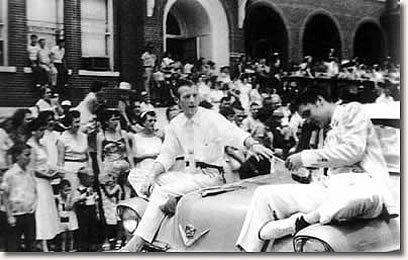
Elvis with Jimmie Rodgers Snow in the parade : Meridian, Mississippi May 26, 1955.
![]() View larger image plus a second with Elvis name painted on the door, and the story of how Elvis came to paint his name on his first pink Cadillac, in the article ......
View larger image plus a second with Elvis name painted on the door, and the story of how Elvis came to paint his name on his first pink Cadillac, in the article ......
![]() The Browns and Elvis Presley : Maxine Brown Recalls Friend Elvis
The Browns and Elvis Presley : Maxine Brown Recalls Friend Elvis ![]()
![]() Elvis with Jimmie Rodgers Snow in the parade : Meridian, Mississippi : May 26, 1955
Elvis with Jimmie Rodgers Snow in the parade : Meridian, Mississippi : May 26, 1955
On this same day Colonel Parker writes a long letter to Bob Neal outlining all that he has done for Presley and offering to work more closely with Neal in promoting the career of the young singer:
'If ever you wish to tie in with me closely and let me carry the ball', he declares in somewhat disingenuous fashion, 'I will be happy to sit down with both of you and try to work it out'.
26 May. Meridian, MS. Junior College Stadium ![]()
26 May. Hamasa Temple Ballroom, Meridian, Mississippi (?)
27 May. Municipal Auditorium, Texarkana, Texas (8.00pm) ![]()
28 May. Dallas, Texas. Sportarium
29 May. Fort Worth, Texas. North Side Cliseum (4pm)
29 May. Dallas, Texas. Sportarium (8pm)
30 May. Fair Park Auditorium, Abilene, Texas
31 May. Midland, Texas. High School Auditorium (7.30 pm)
31 May. Midland, Texas. High School Field House (8.30 pm)
Sometime roughly within the past month, the Presleys have moved out of their apartment on Alabama into a rented single -- family brick home at 2414 LaMarch
1 June. Guymon, OK. High School Auditorium
2 June. City Auditorium, Amarillo, Texas (8.00pm)
2 June. Lubbock, Texas. Johnson Connelley Pontiac Showroom (7pm)
June 3, Elvis, Scotty and Bill perform at the car-dealer show prior to their performance at the Fair Park Coliseum. Glen D. Hardin and Fourteen-year-old Mac Davis attend the show. Mac Davis 'is knocked out by Elvis' performance'. He described himself as 'flabbergasted' after seeing Elvis perform. Elvis will later record the Mac Davis compositions 'Memories', 'In the Ghetto', and 'Don't Cry Daddy'.
3 June. Lubbock, Texas. Fair Park Coliseum ![]() (8.00 pm)
(8.00 pm)
4 June. The Louisiana Hayride. Municipal Auditorium, Shreveport, Louisiana (8pm)
Week of shows in Arkansas and Texas. June 5 - June 10
5 June. Hope, AR. Coliseum in Fair Park
June 5, ![]() After the show Elvis sets off for Texarkana with a girl from that town, while Scotty and Bill ride with other friends. About halfway to Texarkana, in Fulton, Arkansas, Elvis' pink--and--white Cadillac catches on fire and burns. Elvis' mother, Gladys, will always recall how she was awakened out of a sound sleep at home by the feeling that something was wrong. Others recall Elvis sitting by the side of the road, looking desolate as he watched his dreams go up in smoke. From Texarkana Scotty returns to Memphis to get the new pink--and--white Ford Crown Victoria that Elvis has recently purchased for his parents, while Elvis and Bill fly on to Texas.
After the show Elvis sets off for Texarkana with a girl from that town, while Scotty and Bill ride with other friends. About halfway to Texarkana, in Fulton, Arkansas, Elvis' pink--and--white Cadillac catches on fire and burns. Elvis' mother, Gladys, will always recall how she was awakened out of a sound sleep at home by the feeling that something was wrong. Others recall Elvis sitting by the side of the road, looking desolate as he watched his dreams go up in smoke. From Texarkana Scotty returns to Memphis to get the new pink--and--white Ford Crown Victoria that Elvis has recently purchased for his parents, while Elvis and Bill fly on to Texas.
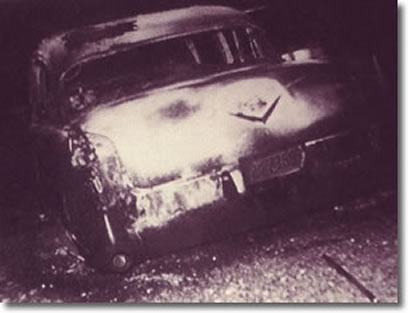
Elvis Presley's Burnt out Cadillac : June 5, 1955.
7 June. High School Auditorium, Andrews, Texas (?)
June 8, MGM Records telegrams Sam Phillips to inquire if Elvis' contract is for sale. Both Phillips and Bob Neal begin at this time to receive unsolicited offers from other major record labels as well.
9 June. Sweetwater, Texas. Auditorium
10 June. Breckenridge, Texas. American Legion Hall
11 June. The Louisiana Hayride. Municipal Auditorium, Shreveport, Louisiana (8pm)
Week long through Mississippi and Texas. June 14 - June 19
14 June. Bruce MS. High School Gymnasium
15 June. Belden MISS. High School Gymnasium
June 17, Bob Neal travels to see the Colonel at his headquarters in Madison, Tennessee, where the two men arrive at the basis of the understanding that the Colonel has been seeking all along. Neal will remain Elvis' manager, but from July 24 all booking and long--term planning will be handled by the Colonel's office, including a concerted effort to move the singer off Sun Records and onto a major label.
17 June. Stamford, Texas. Roundup Hall, High School
18 June. Big D Jamboree - Dallas, Texas. Sportarium ![]()
19 June. Houston, Texas. Cook's Hoedown Club (eve)
Tour with Marty Robbins. June 20 - June 30
June 20, From Beaumont Bob Neal wires the Colonel that he has been unsuccessful so far in his efforts to convince Elvis of the wisdom of leaving Sun, and he feels the Colonel should speak to him.
20 June. Beaumont Texas
21 June. Beaumont Texas (2.30pm, 7.00pm & 9.00pm) ![]()
23 June. Lawton, OK. McMahon Memorial Auditorium (8.00pm)
23 June. Lawton, OK. Southern Club (11pm)
24 June. Altus, OK.
25 June. The Louisiana Hayride. Municipal Auditorium, Shreveport, Louisiana (8pm)
26 June. Biloxi, MS. Slavonian Lodge Auditorium
27 June. Kessler, MS. Air Force Base
Local girl June Juanico ![]() attends the above show with a friend who saw the Slavonian Lodge performance and has told June that Elvis Presley is 'the most gorgeous man I've ever seen in my life'.
attends the above show with a friend who saw the Slavonian Lodge performance and has told June that Elvis Presley is 'the most gorgeous man I've ever seen in my life'.
Elvis picks June out of the crowd and spends the rest of the evening with her. (June wrote an excellent book about their ensuing relationship titled 'In The Twilight of Memory'.)
28 June. Kessler, MS. Air Force Base
29 June. Mobile, AL. Radio Ranch Club
30 June. Mobile, AL. Radio Ranch Club
Tour of six towns in four days. July 1 - July 4
1 July. Plaquemine, LA. Casino Club
2 July. The Louisiana Hayride. Municipal Auditorium, Shreveport, Louisiana (8pm)
3 July. Corpus Christi, Texas. Hoedoen Club
4 July. Stephenville, Texas. City Recreation Hall
4 July. ![]() DeLeon, Texas. Hodges Park (afternoon)
DeLeon, Texas. Hodges Park (afternoon)
4 July. Brownwood, Texas. Soldier's & Sailor's Memorial Hall (8pm)
Elvis participates at these two all--day events approximately twenty miles apart, the first a family picnic put on by gospel promoter W. D. Nowlin, the second an indoor 'Jamboree' with pretty much the same lineup. Influenced by the presence of two of his favourite gospel quartets, the Statesmen and the Blackwood Brothers, Elvis sings nothing but gospel music in De Leon, getting a very poor reception, but does his regular show both in Stephenville and in Brownwood later that evening.
July 5, Elvis returns to Memphis for a two--week vacation.
During this week his next--door neighbour, fifteen--year--old Jackson Baker, recalls hearing Elvis rehearse the song 'Mystery Train', and then, after recording it, listen to the acetate over and over again.
![]() Elvis on Holiday - Water Skiing - July, 1955 & 1956
Elvis on Holiday - Water Skiing - July, 1955 & 1956
July 7, Elvis also buys a pink 1955 Cadillac Fleetwood Sixty ![]() with a black top to replace the Cadillac that has burned. A removable wooden roof rack is used for the band's instruments. Elvis had the car repainted by a neighbor who designed a pink color for Elvis and named the color 'Elvis Rose'. This is the one that he gave to his mother, probably the most famous car in the world. Gladys would always proudly point to it as 'her' car.
with a black top to replace the Cadillac that has burned. A removable wooden roof rack is used for the band's instruments. Elvis had the car repainted by a neighbor who designed a pink color for Elvis and named the color 'Elvis Rose'. This is the one that he gave to his mother, probably the most famous car in the world. Gladys would always proudly point to it as 'her' car.
July 11, 1955 Sun Studio - Memphis, Tennessee
![]() Mystery Train F2WB 8001-01
Mystery Train F2WB 8001-01
![]() I Forgot To Remember To Forget F2WB 8000-NA
I Forgot To Remember To Forget F2WB 8000-NA
![]() Trying To Get To You F2WB 8039-NA
Trying To Get To You F2WB 8039-NA
Elvis successfully records three new songs at Sun.
They are: 'I Forgot to Remember to Forget', an original composition written for him once again by Stan Kesler; Little Junior Parker's 'Mystery Train', which Sam Phillips originally produced on Parker in 1953; and a number by the Washington, D.C., r & b group the Eagles', Trying to Get to You'. Memphis drummer Johnny Bernero plays on all but 'Mystery Train', and the first two songs will become the next single.
![]() Elvis Presley : July 15, 1955 : Joy Drive-In Theatre : Minden, LA.
Elvis Presley : July 15, 1955 : Joy Drive-In Theatre : Minden, LA.
July 16, 'Baby Let's Play House' enters Cash Box's Country and Western chart at #15, marking Elvis' debut on the national charts.
16 July. The Louisiana Hayride. Municipal Auditorium, Shreveport, Louisiana (8pm)
Live recordings are available from this date and will be available on the Sun box set Due late 2008.
Local shows on the way from Louisiana Hayride. July 20 - July 22
20 July. Cape Girardeau MO. Cape Arena
21 July. Newport, AR. Silver Moon Club
July 22, In a conference call, Colonel Parker, Bob Neal, Hank Snow, and Tom Diskin continue the discussion about moving Presley to a major label as well as booking him on a proposed Hank Snow weekly television show. At this point Parker and Snow (in partnership as Hank Snow Attractions, producers of the Jamboree Attractions tours), agree to put up $10,000 in cash to buy Elvis' release from Sun Records. In exchange they would expect a 2 percent share of Elvis' record royalties, calculating that he will receive a standard 5 percent and will presumably be satisfied with the 3 percent that he has been getting from Sun all along. On this same day, in a clearly related development, RCA makes an offer of 'either a flat $12,000 toward settlement and delivery of Presley to RCA', or a $5,000 non refundable bonus to Presley plus $20,000 recoupable from future record royalties. The offer includes the guarantee of an appearance on network television within sixty days of signing and can be presumed to be in response to terms demanded by the Colonel.
23 July. The 'Big D' Jamboree, Sportatorium, Dallas, Texas (8pm)
July 24, As of this date, Elvis Presley will be exclusively represented by Colonel Parker /Hank Snow Attractions, though he continues to be managed by Bob Neal.
Florida Tour. July 25 - July 31
25 July. Fort Myers, FL. City Auditorium
26 July. Orlando, FL. Municipal Auditorium.
27 July. Orlando, FL. Municipal Auditorium
28 July. Jacksonville, FL. Gator Stadium Baseball Park ![]()
30 July. Daytona Beach, FL. Peabody Auditorium (7.30pm & 9.30pm)
31 July. Tampa, FL. Ft. Homer Hesterly Armony ![]() (2.15pm & 8.15pm)
(2.15pm & 8.15pm)
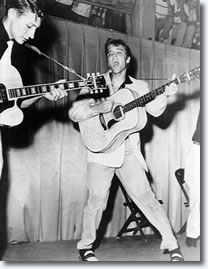 |
|---|
At the Colonel's behest, photographer William V. 'Red' Robertson's takes a series of action shots at the above show, including the tonsil -- revealing portrait that is used for the cover of Elvis' first album the following year.
August 1955, Elvis' fifth and last Sun single 'I Forgot to Remember to Forget'/'Mystery Train' (Sun 223) is released sometime in August, the by--now--classic mix of country and blues. It premieres on Cash Box's regional charts in Ocala, Florida, Memphis and Gladewater, Texas, where local DJs play both sides of the record.
Webb Pierce package tour. Aug. 1 - Aug. 5
1 August. Tupelo, MS. Fairgrounds
This is Elvis' first performance in Tupelo since his appearance at age ten in the singing competition at these same fairgrounds, and it is held before a crowd of about 3,000.
2 August. Muscle Shoals, AL. Sheffield Community (7.00pm & 9.30pm)
Elvis steals the show from headliner Webb Pierce, with Sun newcomer Johnny Cash added to the bill.
3 August. Little Rock, AR. Robinson Auditorium (8.00pm)
4 August. Camden, AR. Municipal Auditorium (7.00pm & 9.30pm)
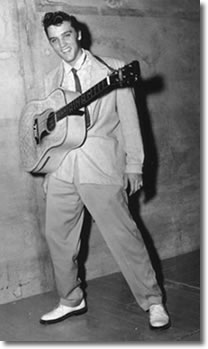 |
|---|
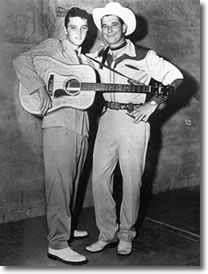 |
Elvis and Texas Bill Strength at the Shell. |
August 5, Bob Neal's eighth annual Country Music Jamboree ![]()
![]() . The show also included Elvis Presley, Webb Pierce, Sonny James, Johnny Cash, Wanda Jackson and some 22 other country music and comedy performers. They drew a crowd of over 4000.
. The show also included Elvis Presley, Webb Pierce, Sonny James, Johnny Cash, Wanda Jackson and some 22 other country music and comedy performers. They drew a crowd of over 4000.
5 August. Memphis. Overton Park Shell ![]()
The Memphis Press Scimitar on August 6 reported that the Shell was jammed with an overflow audience for the show and that several hundred were turned away. Local amateur photographer Robert Dye who photographed Elvis at the Shell on August 5th recalled one performer loaning him his guitar after Elvis couldn't find his in time to go on and was pretty agitated after Elvis returned it with two strings broken.
6 August. River Stadium, Batesville, Arkansas (8.00pm)
Elvis' appearance at this '12th Annual White River Carnival' in Batesville elicits an indignant letter from local promoter Ed Lyon, who writes to the Colonel that Elvis was guilty of unprofessional behaviour, told off--color jokes, and 'stormed off stage' after singing just four songs, thereby 'ruin[ing]' the show. Lyon demands an 'adjustment', and the Colonel swiftly complies with a refund of $50, writing Bob Neal a scathing letter on August 22 about the necessity of establishing professional standards.
Elvis is 'young, inexperienced, and it takes a lot more than a couple of hot records in a certain territory to become a big--name artist', the Colonel lectures Neal, whom he blames both implicitly and explicitly for this foul--up in the education of a young artist.
7 August. Houston, Texas. Magnolia Gardens (matinee)
7 August. Houston, Texas. Cook's Hoedown Club (eve)
Tour of east Texas. Aug. 8 - Aug. 12
August 8, Hayride drummer D. J. Fontana, who has played with the group occasionally both in Shreveport and on Hayride tours, joins Elvis for the first time on a regular basis, but unlike Scotty and Bill he is not a percentage participant but a salaried member of the band.
8 August. Tyler, Texas. Mayfair Building.
9 August. Henderson, Texas. Rodeo Arena
10 August. Gladewater, Texas. Bear Stadium
11 August. Longview, Texas. Reo Palm Isle Club
12 August. Kilgore, Texas. Driller Park
13 August. The Louisiana Hayride. Municipal Auditorium
August 14, Elvis attends Jim Ed and Maxine Brown's parents' twenty--fifth wedding anniversary party in Gladewater, Texas. A photograph of the group includes 1955 Humes High School graduate Red West, who has been going out with the group occasionally throughout the year, and Elvis' sometime accompanists, piano player Floyd Cramer and steel guitarist Jimmy Day.
August 15, Elvis and Vernon Presley attends a meeting in Memphis with Colonel Parker and Bob Neal at which a new contract is signed that names Colonel Parker as 'special advisor', with control of virtually every aspect of the operation. Presley's parents signed a contract on Elvis' behalf as he was not yet 21.
Elvis was still a regional sensation and unknown to the national market when he got the attention of record industry executives. By the summer of 1955, almost all the major and independent record labels were inquiring about him. Sam Philips had mixed feelings about selling Presley's contract, but his record company could not accommodate such a phenomenon, his finances were very tight, and he had other artists who needed his attention. When the Colonel and Elvis signed their first contract, Bob Neal still had a contract as Elvis' manager.
Parker initially signed on as 'special adviser', and his duties were to 'assist in any way possible the buildup of Elvis Presley as an artist'. Parker was also given the right to negotiate renewals on all existing contracts. At this point, Neal was kept on merely as a courtesy. When Neal's contract expired on March 15, 1956, he was completely out of the picture, and Parker became Elvis' full-time manager for a 25 percent cut.
20 August. The Louisiana Hayride. Municipal Auditorium, Shreveport, Louisiana (8pm)
Live recordings of 'Baby Let's Play House', 'Maybellene', and 'That's All Right' are available from this date and will be available on the Sun box set Due late 2008.
Mid Texas Tour. Aug. 22 - Aug. 26
22 August. Wichita Falls, Texas. Spudder Park
23 August. Bryan, Texas. Saddle Club
24 August. Conroe, Texas. High School Football Field
25 August. Austin, Texas. Sport Center
26 August. Gonzales, Texas. Baseball Park
27 August. The Louisiana Hayride. ![]() Municipal Auditorium, Shreveport, Louisiana (8pm)
Municipal Auditorium, Shreveport, Louisiana (8pm)
Jamborees. Sept. 1 - Sept. 3
1 September. New Orleans, LA. Pontchartrain Beach
September 2, Fifteen miles south of Texarkana, Arkansas, Scotty Moore drives the pink and black Cadillac Fleetwood ![]() into an oncoming vehicle that is in the process of passing a pickup truck. Scotty recalls the Cadillac as requiring approximately $1,000 worth of repairs.
into an oncoming vehicle that is in the process of passing a pickup truck. Scotty recalls the Cadillac as requiring approximately $1,000 worth of repairs.
2 September. Texarkana, AR. Arkansas Municipal Stadium
3 September. The 'Big D' Jamboree, Sportatorium, Dallas, Texas (8.00pm) ![]()
3 September. Round-Up Club, Dallas, Texas (1.00am)
Package Tour. Sept. 5 - Sept. 8
Elvis is the headliner on a new five--day tour featuring Johnny Cash, Bud Deckelman, Floyd Cramer, and Eddie Bond. Eddie Bond. It was Bond for whom Elvis unsuccessfully auditioned at the Hi-- Hat on May 15, 1954.
5 September. Forrest City, AR. St. Francis Country Fair And Livestock Show - Smith Stadium
A local musician, Ollie Warren, a high school student at the time, recalls meeting Gladys Presley ![]() at the above show as she sat in the Crown Victoria parked behind the flatbed trailer on which Elvis was performing.
at the above show as she sat in the Crown Victoria parked behind the flatbed trailer on which Elvis was performing.
6 September. Bono, AR. High School Gymnasium
7 September. Sikeston, AR. National Guard Armony
8 September. Clarksdale, MS. City Auditorium ![]() (Larger image)
(Larger image)
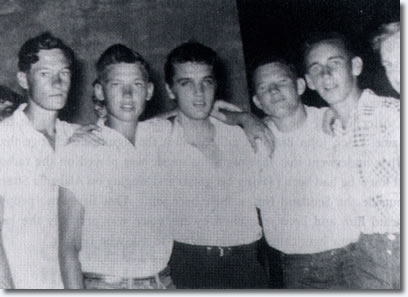
Elvis Presley and friends, backstage : Clarksdale, MS. City Auditorium : September 8, 1955.
9 September.
High School Auditorium, McComb, Mississippi (8.00pm)
10 September. The Louisiana Hayride. Municipal Auditorium, Shreveport, Louisiana (8.00pm)
Hank Snow All-Star Jamboree tour. Sept. 11 - Sept. 22
11 September. Norfolk, VA. City Auditorium (3.00pm & 8.00pm)
12 September. Norfolk, VA. City Auditorium
13 September. New Bern, NC. Shrine Auditorium
14 September. Wilson, NC. Fleming Stadium
September 15, Although all decisions with respect to Elvis' career must by contract go through the Colonel's office, Bob Neal negotiates a new one--year contract with the Hayride, at $200 a performance, a raise of over 1000 percent. Vernon signs the agreement, which goes into effect November 11, 1955, and carries a penalty of $400 for each missed performance beyond the one every two months allowed. One can only surmise that this represents one last attempt by Neal to assert his independence and that it is endorsed by Vernon out of an ingrained hunger for financial security and an almost desperate uncertainty about the future.
15 September. Roanoke, VA. American Legion Auditorium
16 September. Asheville, NC. City Auditorium
September 17, The bickering between Colonel Parker and Bob Neal continues. After being pushed mercilessly by the Colonel, Neal pulls out of their joint arrangement, terming his withdrawal a 'pleasant parting'. The Colonel immediately sends copies of the correspondence to Elvis, expressing the hope that they will be able to work together again in future and concluding somewhat disingenuously, 'Sincerely, Your Pal, The Colonel'.
17 September. Thomasville, NC. High School Auditorium
18 September. Richmond, VA. WRVA Theather (2.30pm & 8.30pm)
19 September. Richmond, VA. WRVA Theather (8.00pm)
20 September. Danville, VA. Fairgrounds (8.00pm)
21 September. Raleigh, NC. Memorial Auditorium (8.00pm)
22 September. Kingsport, TN. Civic Auditorium (8.00pm)
24 September. The Louisiana Hayride. Municipal Auditorium, Shreveport, Louisiana (8.00pm)
26 September. Trinity High School Auditorium, Gilmer, Texas
28 September. Glober, MO. B&B Club
September 30, Actor James Dean is killed, and Bonnie Brown (Jim Ed and Maxine's sister, who sometimes performed with her siblings) recalls Elvis crying in a Gladewater hotel when he heard the news.
Louisiana Hayride Jamboree tour of Texas. Oct. 3 - Oct. 8
1 October. The Louisiana Hayride. Municipal Auditorium, Shreveport, Louisiana (8.00pm)
3 October. College Station, Texas. G. Rolle White Coliseum, A&M University
4 October. Paris, Texas. Boys Club Gymnasium.
5 October. Greenville, Texas. City Auditorium
6 October. San Marcos, Texas. Southwest Texas State University (matinee)
6 October. Austin, Texas. Skyline Club
8 October. Houston, Texas. City Auditorium. Louisiana Hayride, Municipal Auditorium (Remote Broadcast)
9 October. Cherry Springs Dance Hall, Cherry Springs, Texas (The above show is the first in a weeklong tour with Johnny Cash, Wanda Jackson, and fledgling country star Porter Wagoner. )
Elvis Presley Jamboree tour of west Texas. Oct. 10 - Oct. 15
10 October. Brownwood. Texas. Soldiers and Sailors Memorial Hall
11 October. Abilene, Texas. Fair Park Auditorium (7.00pm & 9.30pm)
12 October. Midland, Texas. High School Auditorium
13 October. Amarillo, Texas. City Auditorium
14 October. Senior High School Field House Odessa, Texas
15 October. Lubbock, Texas. Fair Park Auditorium (8.00pm)
15 October. Lubbock, Texas. Cotton Club ![]() (11.00pm)
(11.00pm)
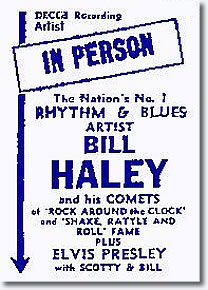
In Person, Bill Haley ..... and ..... Elvis Presley, Scotty and Bill.
Tour. Oct. 16 - Oct. 26
October 16, For one night Elvis joins yet another Hank Snow tour, this one costarring Bill Haley, whose 'Rock Around the Clock' is in its fifth month at the top of the charts. The phenomenal success of Haley's 1954 record, re--released when the song was used over the credits of the hit film The Blackboard Jungle, in some ways certifies the success of the new music and validates its name once and for all as 'rock 'n' roll'. In subsequent weeks Billboard will note the clever strategy of 'Col Tom Parker of Jamboree Attractions, one of the nation's major bookers and promoters of country & western talent, [who] instituted a new policy when he presented a combination of popular and country & western music on a recent one-nighter tour'. It might further be noted that Haley and Elvis are advertised on the top half of the poster, above Hank Snow.
16 October. Municipal Auditorium, Oklahoma City, OK (3.30pm & 8.00pm)
17 October. El Dorado, AR. Memorial Auditorium
![]() Elvis hugging fan Jan Edwards, backstage, Richmond, Virginia, during the Hank Show tour 1955.
Elvis hugging fan Jan Edwards, backstage, Richmond, Virginia, during the Hank Show tour 1955.
19 October. Cleveland, OH. Circle Theatre (7.30pm & 10.00pm)
![]() Elvis signs autographs for some female admirers in Cleveland, October 19, 1955.
Elvis signs autographs for some female admirers in Cleveland, October 19, 1955.
October 20, In what will turn out to be the penultimate act of the long struggle of wills between Bob Neal and Colonel Parker, Gladys and Vernon Presley sign a telegram provided by Tom Diskin granting the Colonel 'sole and exclusive' representation of their son with respect to 'all negotiations' for a new recording contract. Diskin's accompanying message seeks to reassure the Presleys that they are in the 'most competent hands'.
20 October. Brooklyn High School Auditorium, Cleveland, Ohio (1.30pm)
![]() October 20, 1955, Elvis, Scotty and Bill
October 20, 1955, Elvis, Scotty and Bill
This is a show put together by Cleveland DJ Bill Randle, who, in his October 22 column in the Cleveland Press, describes the film to be made from it, a Universal picture in which Randle will be 'supported by Pat Boone, the Four Lads, Bill Haley and his Comets, and the phenomenal Elvis Presley. Called 'Top Jock' [or 'A Day in the Life of a Famous Disc Jockey'], the film will run about 15 minutes when it hits your movie house'. It never did, and it never has--though the show by all accounts sounds fabulous. Whether it was the Colonel or union problems that blocked its release, in subsequent years the footage has never been located, though some stills survive.
20 October. St. Michaels Hall, Cleveland, Ohio (8.00pm) Hosted once again by Bill Randle, this show climaxed, according to Randle's later recollection, when Elvis broke the strings on his guitar and then smashed the guitar on the floor'. It was mass hysteria', recounted the DJ'. We needed police to get him out of the hall'.
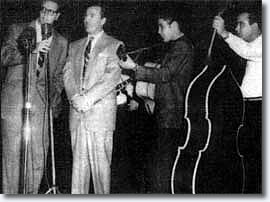
Elvis Brooklyn High School October 20, 1955.
Pictured above is Elvis and Tommy Edwards at Brooklyn High School on October 20, 1955. However, Elvis was not the headliner that evening. There were other stars including Bill Haley and The Comets, Pat Boone, The Four Lads. This is the first time Pat Boone and Elvis met each other.
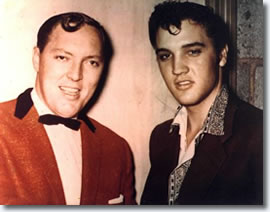
Bill Haley & Elvis Presley : October 20, 1955.
This photo of Elvis & Bill Haley was taken by Tommy Edwards, a WERE Disc jockey, at Brooklyn High School on October 20th, 1955.
October 21, Carl Perkins did a show at Jackson's Union University. Carl and the band began blazing away on some rockabilly and got the room shaking. Carl had finished singing a song and was regrouping for the next number when he heard a harsh-sounding male voice near the front of the stage. The male was angry at his date, who was standing there silent but visibly distraught.
'Uh-uh', the boy said in a stern, forceful voice. 'Don't step on my suede's!' When Carl looked down he could see the boy was indeed wearing blue suede shoes, one of which now had a white scuff mark on the toe.
Carl could not understand why a guy would value a pair of shoes over the pretty girl he was dancing with.
When Carl got home he couldn't 'unwind' and laying in bed the images he saw on the dance floor flashed through his head. He recalled Johnny Cash's suggestion that in blue suede shoes lay a story. He began to put the words together. Carl wrote 'Blue Suede Shoes' that night.
21 October. St. Louis MO. Missouri Theatre
22 October. St. Louis MO. Missouri Theatre (7.30pm & 9.30pm)
23 October. St. Louis MO. Missouri Theatre (2.00pm & 5.00pm)
Elvis is scheduled to open the 2:00 p.m. show but arrives late, saying that he was searching for his wallet. As a result of his tardiness, he is not permitted to perform and, with the Colonel's approval, is docked $125 pay.
October 24, Colonel Parker telegrams Sam Phillips from the Warwick Hotel in New York to inform him that he has been authorized by Elvis' parents to handle all negotiations for the sale of Elvis' Sun Records contract. Putting the horse somewhat after the cart, Parker asks Phillips to name his price.
24 October. Newport, AR. Silver Moon Club
25 October. Armory, Houston, Mississippi
26 October. Vigor High School, Mobile, Alabama (10.00am) -- After thirty minutes the school principal stops the show when Elvis tells an off--color joke about 'milking through the fence'.
26 October. Greater Gulf State Faif, Prichard, Alabama (3.30 & 7.30pm)
27 october. National Guard Armory, Jackson, Alabama
28 October. Curtis Gordon's Radio Ranch, Mobile, Alabama
October 29, Colonel Parker drives to Memphis to meet with Sam Phillips and hammer out the terms of an option agreement. It will take effect on October 31 and give Parker until November 15 to put down a non refundable deposit of $5,000 against the $35,000 purchase price for Elvis' recording contract.
29 October. Shreveport. Louisiana Hayride, Municipal Auditorium (8pm)
October 30, Elvis returns to his new home on Getwell.
During the week Elvis goes into the Sun studio one last time to record a B--side for 'Trying to Get to You'. There appears to be some mix--up in communications, because the session breaks off in the middle after several attempts at 'When It Rains It Really Pours', a Billy 'The Kid' Emerson blues, and drummer Johnny Bernero comes away with the clear impression that this is because Elvis' contract is about to be sold.
Week-long circuit of east Texas and the South. Nov. 5 - Nov. 12
November 5, The latest single, 'I Forgot to Remember to Forget'/'Mystery Train', appears on three of Billboard's national charts, representing country music sales, jukebox, and radio play.
5 November. Shreveport. Louisiana Hayride, Municipal Auditorium (8pm)
6 November. Biloxi, MS. Community House (2.00pm & 8.00pm)
7 November. Keesler, MS. Airmen's Club, Keesler Air Force Club
8 November. Keesler, MS. Airmen's Club, Keesler Air Force Club
November 10, Elvis attends the fourth annual Country Music Disc Jockey Convention in Nashville, where he tells everyone he meets of his imminent switch to RCA, although the Colonel has yet to finalize the deal.
In his room at the Andrew Jackson Hotel, Mae Boren Axton plays him a demo of a new song she has written with Tommy Durden called 'Heartbreak Hotel'.
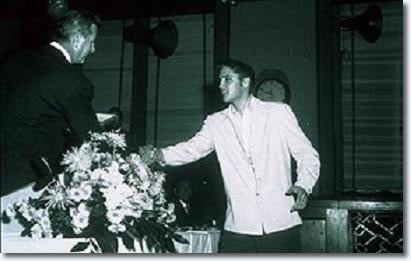
Elvis Presley : Country Music Disc Jockey Convention : November 10, 1955.
By the time of the DJ Convention in Nashville, on November 10, the Colonel was sure enough of his deal that everyone knew there was something in the air, but whether RCA was aware that Sam Phillips would not move off his original price or Phillips knew of the RCA shortfall is doubtful.
November 11, After a second day of meeting DJs at the convention, Elvis flies home to Memphis.
12 November. Carthage, Texas. Carthage Milling Co (aft.) (2pm)
12 November. Shreveport. Louisiana Hayride, Municipal Auditorium (8pm)
Western Swing Jamboree tour. Nov. 13 - Nov. 19
13 November. Memphis, Ellis Auditorium (3.00pm & 8.00pm)
This 'Western Swing Jamboree', dedicated to departing KWEM DJ Texas Bill Strength, who is bound for Minneapolis, and featuring Texas--born, Princeton--educated, star of western swing and honky tonk Hank Thompson, top country act Carl Smith, Charlene Arthur, and Sun artist Carl Perkins (just a few weeks away from recording his first hit 'Blue Suede Shoes'), marks the beginning of a six--day tour.
November 14, Undoubtedly in response to Harry Kalcheim's suggestion of two weeks before, and despite the fact that the deal with RCA has yet to come together, the Colonel informs the William Morris agent that he would be 'interested in making a picture with this boy. However, we must be very careful to expose him in a manner befitting his personality, which is something like the James Dean situation'. Two days later he will elaborate further, wondering if Warner Brothers may have shelved plans for any James Dean pictures for which his boy might be suited'. Believe me', he informs Kalcheim', if you ever follow one of my hunches, follow up on this one and you won't go wrong'. He adds that he already has three tentative coast--to--coast television appearances for Elvis--which would appear, on the evidence, to have been tentative indeed.
14 November. Forrest City, AR. High School Auditorium (7.00pm & 9.15pm)
November 15, Colonel Parker finally wears down RCA after a barrage of phone calls and telegrams. On the last day of the option Bill Bullock agrees to Sam Phillips' price of $35,000, an unheard--of amount, and Parker sends Phillips the $5,000 earnest via airmail, special delivery.
Several days later he receives a refund from RCA, but he will always point to the fact that it was his money that secured Presley's contract, his money that was at risk.
15 November. Sheffield, AL. Community Center (7.00pm & 9.30pm)
16 November. Camden, AR. City Auditorium (7.00pm & 9.15pm)
November 17, Johnny Cash joins the show for this performance and is amazed to see Elvis take time to carefully hand-wash his car after driving it through the rain and mud on his way to Texarkana.
17 November. Texarkana. Arkansas Municipal Auditorium (Later Hut Club) (7.00pm & 9.15pm)
18 November. Longview, Texas. Reo Palm Isle Club
19 November. Louisiana Hayride live broadcast from Gladewater, Texas. High School (8pm)
Elvis performs 'Baby Let's Play House', 'That's All Right', and Bill Haley's 'Rock Around the Clock'.
November 20, Elvis flies back to Memphis.
November 20 or 21, 1955 Sun Studio - Memphis, Tennessee
![]() When It Rains It Really Pours NPA5 5826-11
When It Rains It Really Pours NPA5 5826-11
November 21, 1955, Elvis signs his first contract with RCA Records. Colonel Parker negotiates the sale of Elvis' Sun contract to RCA, which includes his five Sun singles and his unreleased Sun material. The price is an unprecedented $40,000, with a $5,000 bonus for Elvis. RCA soon re-releases the five Sun singles on the RCA label. At the same time Elvis signs a contract with Hill and Range Publishing Company, which is to set up a separate firm called Elvis Presley Music, Inc. Elvis will share with Hill and Range the publishing ownership of songs bought by Hill and Range for him to record. Elvis is the hottest new star in the music business.
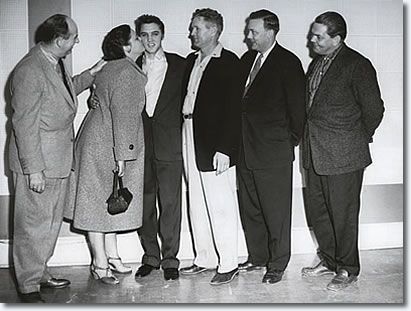
Elvis after signing his first contract with RCA Records - November 21, 1955.
The Memphis Pres- Scimitar ran the story the next day:
Elvis Presley, 20, Memphis recording star and entertainer who zoomed into the big time and the big money almost overnight, has been released from his contract with Sun Record Co.of Memphis. . . . Philips and RCA officials did not reveal terms but said the money involved is probably the highest ever paid for a contract release for a country-western recording artist. 'I feel Elvis is one of the most talented youngsters today', Philips said', and by releasing his contract to RCA- Victor we will give him the opportunity of entering the largest organization of its kind in the world, so his talents can be given the fullest opportunity'.
Live Performances November 1955
25 November. Port Arthur, Texas. Woodrow Wilson Junior High School (8.00pm)
November 26, The Colonel writes to Neal, who will remain Elvis' personal manager by contract for another four months, to be sure that Elvis reports to all his shows on time. He advises Neal once again to remind Elvis to cut out the comedy during the shows and make sure the band does as well.
26 November. Shreveport. Louisiana Hayride, Municipal Auditorium (8pm)
29 November. Mosque Theatre (Phillip Morris Employees Night), Richmond, Virginia
November 30, Elvis and the Colonel fly to New York, where they register at the Hotel Victoria.
December 1, Elvis was in new York ![]() December 1, 1955 to meet with the Colonel and RCA executives, including president Larry Kanaga and publicity director Anne Fulchino. A photo shoot has been arranged and pictures of Elvis and the Colonel, Elvis and Steve Sholes and Elvis and fellow RCA recording artists Eddy Arnold who happened to be in New York for a session. The photo's are taken in RCA's Twenty-fourth Street studio, along with posed action shots that will be used on the back of Elvis' first album Elvis Presley.
December 1, 1955 to meet with the Colonel and RCA executives, including president Larry Kanaga and publicity director Anne Fulchino. A photo shoot has been arranged and pictures of Elvis and the Colonel, Elvis and Steve Sholes and Elvis and fellow RCA recording artists Eddy Arnold who happened to be in New York for a session. The photo's are taken in RCA's Twenty-fourth Street studio, along with posed action shots that will be used on the back of Elvis' first album Elvis Presley.
Live Performances December 1955
December 2, RCA re-releases Elvis' latest Sun single, 'I Forgot to Remember to Forget'/'Mystery Train', while it is still high on the national country--and--western charts.
2 December. Atlanta, GA. Sport Arena
December 3, Billboard announces that Elvis', one of the most sought--after warblers this year, signed two big--time contracts', one with RCA and one with Hill and Range, the music publishing company under which newly formed BMI company Elvis Presley Music will operate. The story points out that RCA plans to push Elvis' 'platters in all three fields--pop, r.&b., and c.&w. However, RCA . . . plans to cut the warbler with the same backing--electric guitar, bass fiddle, drums and Presley himself on rhythm guitar--featured on his previous Sun waxings'.
3 December. Montgomery, AL. State Coliseum
4 December. Indianapolis, IN. Lyric Theather (8.00pm)
December 5, While in Indianapolis, Elvis and Anita Carter take a tour of the RCA manufacturing plant.
5 December. Indianapolis, IN. Lyric Theather (8.00pm)
6 December. Indianapolis, IN. Lyric Theather (8.00pm)
7 December. Indianapolis, IN. Lyric Theather (8.00pm)
8 December. Louisville, KY. Rialto Theather
9 December. Swifton, Arkansas High School ![]() (7.00pm) - Elvis appears with Johnny Cash
(7.00pm) - Elvis appears with Johnny Cash
9 December. Swifton, Arkansas B&I Club (Later in the evening) - Elvis appears with Johnny Cash
In B&I Club owner Bob King's recollection, ......
Elvis sings 'Heartbreak Hotel' and declares, 'It's gonna be my first hit'.
10 December. Shreveport. Louisiana Hayride, Municipal Auditorium (8pm)
December 12, Elvis appears with Johnny Cash and Carl Perkins on the following show in Amory.
At the time Carl hadn't yet had his big hit, but he'd had Movie Mag, he'd played the venue several times before on his own, and they loved him. Carl went on first and someone in the crowd called out 'Only You', Carl. Carl responded by immediately staring the song and tore the place up; the fans went absolutely nuts.
When Carl left the stage he found Elvis sitting in front of a row of lockers, head down, oblivious to everyone around him. Elvis was always the first to congratulate Carl so he knew something was amiss.
Elvis had planned to sing 'Only You' that night but had not told Carl. Elvis nerves were made worse knowing he could not go with the song he had planned and that he felt Carl did so well.
When Elvis went on, midway through the first song a call started building from the crowd, and soon engulfed the entire building: 'We want Carl!' Standing in the wings Carl became unnerved. He felt Elvis was being treated rudely and unfairly. But as Carl tells it, 'It did not take long for Elvis to find his groove' and leave Carl little reason to feel sorry for him. Whatever emotion Elvis was feeling, he channeled it into a performance to rival the best Carl had ever seen from anyone. Over the next hour he watched awestruck as Elvis 'just poured it on. Sweat popped out on him and was drippin' to the floor and he had that hair flyin' and them legs movin'. He dug deep. He pulled it off - he rocked! They wasn't hollerin' 'Perkins' at the end. They only did that for a little bit after he first came out. That really embarrassed me'.
12 December. National Guard Armory, Armory, Mississippi
December 13, Harry Kalcheim is furious when he learns that Colonel Parker has booked Elvis for four consecutive weeks in January on CBS's Saturday night variety show, Jimmy and Tommy Dorsey's Stage Show, through another agent, Steve Yates.
December 15, After a night off, the Perkins and Presley troupes reassembled in Helena, Arkansas, for a double bill. Carl didn't sing 'Only You' that night but again performed well.
Elvis came out to an instant repeat of the Armory show, and again had to jack up his own performance a few notches to quell the audience's chant for Carl. But he succeeded.
15 December. Catholic Club, Helena, Arkansas
16 December. Municipal Auditorium, Sweetwater, Texas
17 December. The Louisiana Hayride. Municipal Auditorium, Shreveport, Louisiana (8pm)
Elvis performs six songs, including Tennessee Ernie Ford's huge hit on Merle Travis' parable of the coal mines', Sixteen Tons', the Platters' doo--wop classic 'Only You' and Little Richard's debut (and definitive) rocker, 'Tutti Frutti'. The crowd does not want to let him leave the stage.
The Colonel sends Bob Neal the Stage Show contract for Elvis to sign, pointing out that there must be no 'ad libs or gestures' on the show other than those the producer recommends.
19 December. Memphis, Ellis Auditorium, Memphis, Tennessee ![]()
December 20, RCA re--releases the four earlier Sun singles: 'That's All Right'/'Blue Moon of Kentucky', 'Good Rockin' Tonight'/'I Don't Care If the Sun Don't Shine', 'Milkcow Blues Boogie'/'You're a Heartbreaker', and 'Baby Let's Play House'/'I'm Left, You're Right, She's Gone'.
December 22, Steve Sholes of RCA sends Elvis demonstration records of ten songs he would like him to consider for his first RCA recording session, scheduled for January in Nashville. Elvis will eventually record two out of the ten; 'I'm Counting On You' and 'I Was The One'.
December 24, Elvis remains at home over Christmas.
He does not appear on the Louisiana Hayride show this week.
31 December. The Louisiana Hayride. Municipal Auditorium, Shreveport, Louisiana
![]() An Overview of
the Audio Restoration - Elvis At SUN
An Overview of
the Audio Restoration - Elvis At SUN ![]()
![]() Elvis' middle name, is it Aron or Aaron?
Elvis' middle name, is it Aron or Aaron?
Next Elvis Presley 1956
![]() 50's Masters |
50's Masters | ![]() 60's Masters |
60's Masters | ![]() 70's Masters
70's Masters
Elvis CDs Covering 1953-1955
![]() Elvis Presley 1950s Albums on CD
Elvis Presley 1950s Albums on CD
 Tupelo's Own Elvis Presley DVD
Tupelo's Own Elvis Presley DVD
Never before have we seen an Elvis Presley concert from the 1950's with sound. Until Now! The DVD Contains recently discovered unreleased film of Elvis performing 6 songs, including Heartbreak Hotel and Don't Be Cruel, live in Tupelo Mississippi 1956. Included we see a live performance of the elusive Long Tall Sally seen here for the first time ever. + Plus Bonus DVD Audio.
This is an excellent release no fan should be without it.
The 'parade' footage is good to see as it puts you in the right context with color and b&w footage. The interviews of Elvis' Parents are well worth hearing too. The afternoon show footage is wonderful and electrifying : Here is Elvis in his prime rocking and rolling in front of 11.000 people. Highly recommended.
Tupelo's Own Elvis Presley DVD Video with Sound.






